All products
-
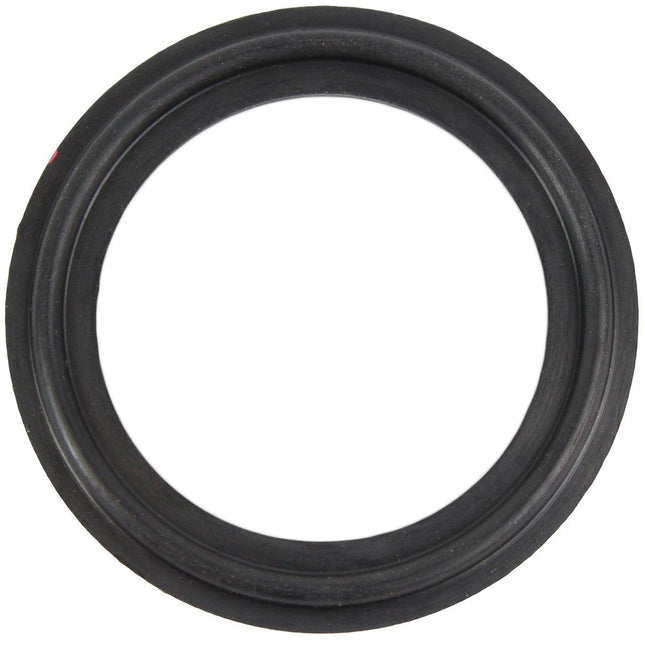

Buna-N Tri-Clamp Gaskets (Made in USA, FDA Compliant / Meets 3A Standards)
BUNA-N Tri-Clamp Gaskets Buna-N Tri-Clamp gaskets are the preferred choice of material when using a closed loop, closed column, or open blast extraction when butane or propane are used as the extraction solvent. Buna-N Gaskets offer a lower temperature rating and have better physical properties than Viton gaskets; the best part is that they cost less than Viton and provide the same chemical resistance to butane and propane. Note: BUNA-N is not recommended for use with certain alcohols Key Features: Lower temperature range Lower costs Better compressibility and springiness Excellent resistance to butane and propane Better tear resistance Better abrasion resistance. FDA CFR 177.2600 – Rubber and Rubber-Like Material for Repeated Use/Contact with Food. FDA CFR 177.1550 – Fluorocarbon Resins for Repeated Use/Contact With Food, Dairy & Pharmaceutical Products. Sizes Available: 1.5" 2" 3" 4" 6" 8" - easy on flanged 10" - easy on flanged 12" - easy on flanged Technical Specifications: Material BUNA-N (Nitrile) Color Black Connection Type Tri-Clamp Conformance FDA Compliant / Meets 3A Standards Thermal Properties: -Low Temperature Range -70°F -Minimum for Continuous Use (Static) -40°F -Brittle Point -70°F -High Temperature Range +210°F to +250°F -Maximum for Continuous Use (Static) +250°F Gas Permeability Excellent Durometer or Hardness Range 65 Shore A Tensile Strength Range 200-3500PSI Elongation Range (%) 350-650% Abrasion Resistance Excellent Tear Resistance Excellent Resilience / Rebound Good Thread Style Female Chemical Compatibility: Butane A - Excellent Propane (liquified) A - Excellent Alcohols: -Amyl B - Good -Benzyl D - Severe Effect -Butyl C - Fair -Diacetone D - Severe Effect -Ethyl C - Fair -Hexyl A - Excellent -Isobutyl B - Good -Isopropyl B - Good -Isopropyl B - Good -Methyl A - Excellent -Octyl B - Good -Propyl A - Excellent No more than a -40 F operating temperature should be used with BUNA-N. BVV is not responsible if incompatible chemicals, solvents, or operating temperatures are used in the user's system.
$1.25 - $40.00
-


200 Proof Ethanol - USP Kosher - Excise Tax Included
Food Grade Alcohol - 200 Proof EXCISE TAX INCLUDED IN PRICING. HAZMAT ITEMS ARE NON-REFUNDABLE. ALL SALES ARE FINAL Food Grade Ethanol 200 Proof is USP-NF Certified & Kosher Certified. This product is the highest purity possible for extraction grade ethanol on the market, at 99.97% pure. Provides unmatched purity while performing extractions for crude oil or even cleaning equipment. 200 Proof Ethanol is a great choice when processing oil for short path distillation processes because it can be immediately winterized, filtered, and then rotary evaporated to recover the ethanol for later usage. United States Pharmacopeia (USP) and the National Formulary (NF) Certified. *Kosher Certified Product only comes in 270 gallon totes. Shop this product in sizes: 1 quart, one gallon, or 5 gallons. What Is Lab & Food Grade Ethanol? Pure Ethanol 200 Proof is also referred to as pure alcohol, absolute alcohol, grain alcohol, and pure grain alcohol. Due to its lack of additives, Food & Lab grade ethanol is considered a safe solvent, and is used in many processes: manufacturing processes, cosmetics processes, herbal tincture produce, food processing, and most commonly, botanical oils and extracts. Our product is safe for sanitizing, surface cleaning without streaking, sterilization, disinfecting, and antiseptic and tinctures. *Disclaimer(s): 1 Quart Bottles are exempt from additional Hazmat shipping charges and can ship immediately, Less paperwork for shipping is required for shipping only 1 single bottle per order. Spigots/Faucets are only compatible with 5 Gallon Plastic Jugs and must be purchased separately Shipments of this product require a 21+ signature at delivery Chemical Formula: C2H6O Molecular Weight: 46.069 CAS Registry Number: 64-17-5 Appearance Colorless Liquid Odor: wine-like, pungent Density 0.78945 g/cm3 @ 20 °C Boiling Point: 78.23C/172.81F Solubility in water: Miscible GHS Pictograms: GHS Signal Word: Danger GHS Hazard Statements: H225, H319, H360D GHS Precautionary Statements P210, P233, P240, P241, P242, P305+P351+P338 UN Identification Number: 1170 Proper Shipping Name: Ethyl Alcohol Transport Hazard Class: 3 Packing Group: II DOT Placard: Federal & State Law Requirements You must be the age of 21 or over to purchase this ethanol product. All Alcohol and Tobacco Tax Trade Bureau (TTB), federal, state and local laws must be complied with, and you may be required to provide BVV™ with your state or federal license. (Note: Container style and color may vary) 200 Proof Ethanol Safety Data Sheet (SDS) 200 Proof Ethanol Certificate of Analysis (COA)
$25.00 - $6,930.00
-
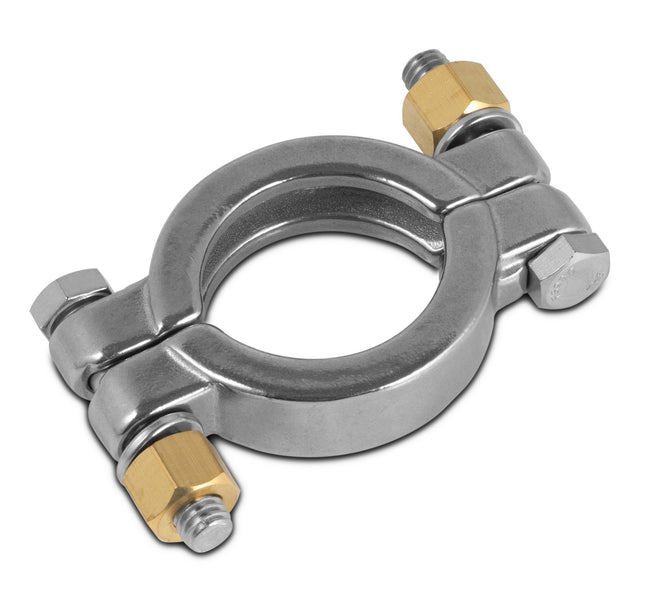

High Pressure Clamps
High Pressure Clamps BVV recommends tightening all High Pressure to their specified Inch-LBS of torque. We do not recommend tightening high-pressure bolts with an impact gun because this may cause threads to jump or be marred which can cause failure of the bolt or seal. For Torque Specification use the link to the data sheet below. Torque Specification Data Sheet Specifications: Mounting Type: Bolted Material: 304 Stainless Steel Bolt Material: 304 Stainless Steel (3/8"-16 Bolt) Nut Material: Brass (5/8 Wrench Size w/ 3/8"-16 Thread Size) Connection Type: Tri-Clamp
$12.00 - $120.00
-
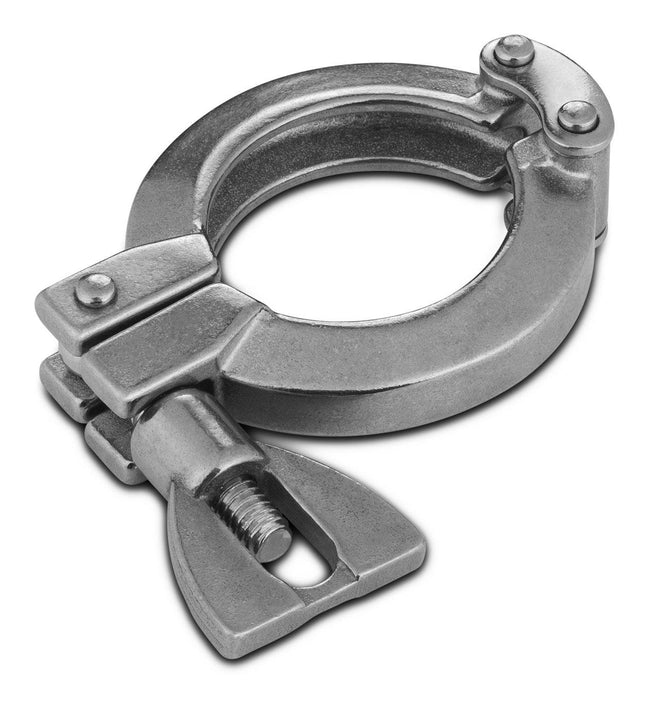

Tri-Clamp Single Hinge Clamp
Tri-clamp/ Tri Clover Single Hinge Clamp BVV™ recommends tightening all Standard Pressure Clamps (Non-High Pressure) to finger tight and then use either a screwdriver or wrench to tighten them approximately 2 full turns to achieve the torque specified on the data sheet. All tightening should be accordance with the data sheet. It is not recommended to overtighten the clamp and bottom it out as this will cause the gasket to be over-compressed and put too much tension on the clamp threads, which could cause it to fail. Overtightening can also cause stretching on the clamp reducing its operational effectiveness. Torque Specification Data Sheet Specifications: Mounting Type: Hinged (The 1.5" Clamp is Double Hinged) Material: 304 Stainless Steel Bolt Material: 304 Stainless Steel (3/8"-16 Bolt) Nut Material: Brass (5/8 Wrench Size w/ 3/8"-16 Thread Size) Connection Type: Tri-Clamp
$9.00 - $83.00
-
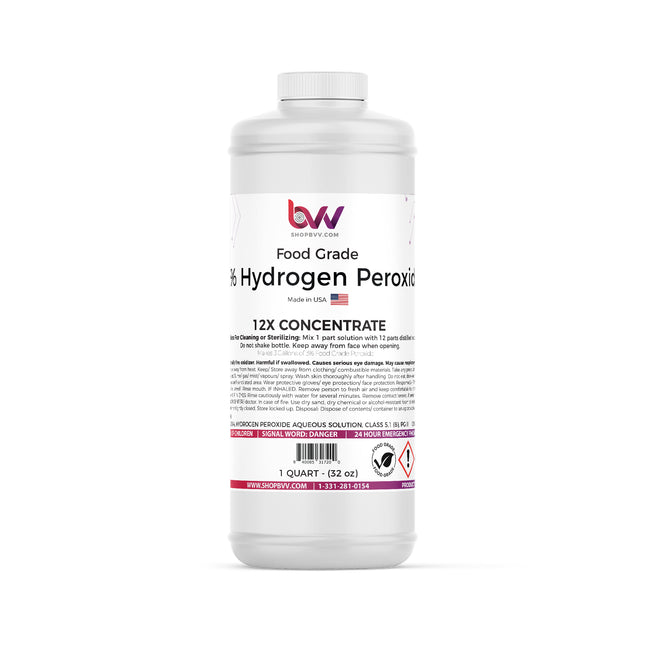

Hydrogen Peroxide 35% Food Grade
35% Food Grade Hydrogen Peroxide This is the second highest concentration of hydrogen peroxide we offer just under our 50% Food Grade Hydrogen Peroxide. Our food-grade peroxide is clear, colorless, and free of any stabilizers or additives. Peroxide is one of the most effective oxidizers and may be applied to food directly to food products. Our peroxide is certified FCC (Food Chemical Codex). It has been tested and verified for its quality and purity. 35% Food Grade Hydrogen Peroxide Certificate of Analysis 35% Food Grade Hydrogen Peroxide Safety Data Sheet Our food-grade hydrogen peroxide is 12x strength, when diluted you can make a remarkably large volume of 3% hydrogen peroxide that can be used for a wide variety of applications. 1 Quart 35% Makes 4.2 Gallons of 3% 1 Gallon 35% Makes 11.5 Gallons of 3% 5 Gallon 35% Makes 57.8 Gallons of 3% 55 Gallon 35% Makes 634 Gallons of 3% Some applications include... Elevating Plant Growth: Diluted hydrogen peroxide supports healthy roots and elevated oxygen availability in the soil. Excellent Cleaner for Food Prep Environments: Hydrogen peroxide is a disinfectant, that kills viruses and various forms of bacteria. Bleaching: Diluted hydrogen peroxide is a mild bleaching agent that can be used to clean stains. Cleansing Fresh Produce: Diluted hydrogen peroxide can be used to clean fruits and vegetables. Mold and Mildew Removal: Hydrogen peroxides strong oxidative qualities breakdown mold and mildew with ease. How to Dilute 35% Hydrogen Peroxide to 3% Hydrogen Peroxide: 35% food-grade hydrogen peroxide Deionized distilled water A clean, empty Gallon bottle for the final 3% hydrogen peroxide solution Measuring cup Funnel Safety goggles Rubber gloves Apron or old clothes Steps to perform dilution: Wear safety goggles, rubber gloves, an apron or old clothing to protect yourself from spills and splashes. Choose a well-ventilated space. Mix 1 part 35% hydrogen peroxide with 11 parts distilled water. Example: Mix 1 cup hydrogen peroxide, with 11 cups of distilled water. To be exact, this will make a slightly less than 3% solution of hydrogen peroxide – 2.92%. What Is Hydrogen Peroxide? Hydrogen peroxide (H2O2) is a chemical compound composed of two hydrogen atoms and two oxygen atoms. It is a clear, colorless liquid with a slightly more viscous consistency than water. Hydrogen peroxide is commonly used for its powerful oxidizing properties and has a wide range of applications in various industries and household settings. Chemical Formula: H2O2 Molecular Weight: 34.015 g/mol CAS Registry Number: 7722-84-1 Appearance Colorless Liquid Odor: None Density 1.11 g/cm3 Boiling Point: 106 °C (223 °F) Solubility in water: Completely Soluble GHS Pictograms: GHS Signal Word: Danger GHS Hazard Statements: H272, H302, H318, H335 GHS Precautionary Statements P210, P220, P260, P261, P264, P270, P271, P280, P283, P301+P317, P301+P330+P331, P302+P361+P354, P304+P340, P305+P354+P338, P306+P360, P316, P317, P321, P330, P363, P370+P378, P371+P380+P375, P405, P420, and P501 UN Identification Number: 2014 Proper Shipping Name: 35% Hydrogen Peroxide, Aqueous Solution Transport Hazard Class: 5.1, 8 Packing Group: II DOT Placard: What Is Hydrogen Peroxide Used For? Hydrogen peroxide (H2O2) is used for a wide range of purposes in various industries and household settings due to its versatile properties. Some common uses of hydrogen peroxide include: Disinfectant and Antiseptic: Hydrogen peroxide is a common disinfectant and antiseptic agent. It is used to clean wounds, cuts, and minor injuries to prevent infection. In lower concentrations (typically 3%), it can be safely applied to the skin. Hair Bleaching and Dyeing: Many hair bleaching and hair dyeing products contain hydrogen peroxide as it can help break down the natural pigments in hair, lightening its color. Teeth Whitening: Hydrogen peroxide is used in some teeth whitening products and dental treatments to remove stains and discoloration from teeth. Cleaning Agent: It is used as a cleaning agent for surfaces, fabrics, and contact lenses due to its ability to break down and remove organic stains and deposits. Water Treatment: In water treatment processes, hydrogen peroxide can be used to remove contaminants, oxidize organic matter, and disinfect water supplies. Rocket Propellant: In the aerospace industry, highly concentrated hydrogen peroxide (usually around 90% purity) is used as a rocket propellant. Chemical Synthesis: Hydrogen peroxide is used in the synthesis of various chemicals and pharmaceuticals. Environmental Applications: It can be employed for soil and groundwater remediation, helping to break down pollutants and contaminants. Food Industry: In the food industry, hydrogen peroxide can be used for cleaning and disinfection of equipment and packaging materials. Cosmetics: It is used in some cosmetic and personal care products, such as hair dyes, hair bleaches, and skin creams. Textiles: Hydrogen peroxide is used in the textile industry to bleach fabrics and remove stains. Paper and Pulp Industry: It is used for bleaching paper pulp and improving the quality of paper products. Agriculture: In agriculture, hydrogen peroxide can be used as an oxygen source in soil, promoting plant growth. Medical and Laboratory Use: It is utilized for cleaning and sterilizing medical equipment and laboratory instruments. First Aid: Hydrogen peroxide is a household item for treating minor cuts and scrapes. The specific application and concentration of hydrogen peroxide used can vary depending on the intended purpose. Higher concentrations are typically used in industrial and chemical applications, while lower concentrations are common in household and personal care products. It's important to handle hydrogen peroxide with care, follow safety guidelines, and use the appropriate concentration for a given task. How Is Hydrogen Peroxide Produced? Hydrogen peroxide (H2O2) is typically produced through one of two main methods: the anthraquinone process and the direct synthesis process. Both processes involve the reaction of hydrogen and oxygen in the presence of a catalyst to form hydrogen peroxide. Here's an overview of these two methods: Anthraquinone Process: This is the most common method for commercial hydrogen peroxide production. It involves a series of chemical reactions that use anthraquinone derivatives as catalysts. The process typically consists of the following steps: Hydrogenation: Anthraquinone derivatives are hydrogenated with hydrogen gas (H2) to form hydroquinone derivatives. Autoxidation: The hydroquinone derivatives react with oxygen (O2) to form anthraquinone derivatives again, while producing hydrogen peroxide in the process. Extraction: The hydrogen peroxide is then extracted from the reaction mixture. Oxidation of Anthraquinone: The anthraquinone derivatives are oxidized back to their original form for reuse in the process. Direct Synthesis Process: In this method, hydrogen and oxygen are directly combined to produce hydrogen peroxide using a catalyst. The reaction typically occurs in a gas-phase reactor, and the process is often referred to as the "direct synthesis" or "hydrogenation-oxygenation" process. Common catalysts used in this process include palladium or platinum on a support material. While these are the main methods for hydrogen peroxide production, there are other less common methods as well. The choice of production method depends on factors such as the desired concentration of hydrogen peroxide, production scale, and cost considerations. It's worth noting that hydrogen peroxide is a sensitive compound and can decompose over time, especially when exposed to heat, light, or contaminants. Therefore, it requires careful handling and storage to maintain its stability and effectiveness. Does Hydrogen Peroxide Expire? Hydrogen peroxide can degrade over time and may lose its effectiveness, so it can be said to have a shelf life rather than a strict expiration date. The shelf life of hydrogen peroxide depends on several factors, including its concentration, exposure to light, temperature, and how well it's stored. Here are some general guidelines: Concentration: Higher concentrations of hydrogen peroxide (e.g., 30% or 35%) tend to be more stable and have a longer shelf life compared to lower concentrations (e.g., 3% or 6%). Exposure to Light: Hydrogen peroxide is light-sensitive, and exposure to ultraviolet (UV) light can accelerate its decomposition. It is typically sold in brown or opaque containers to protect it from light. Temperature: Storage at higher temperatures can also speed up the decomposition of hydrogen peroxide. It should be stored at a cool, dry place away from heat sources. Contaminants: Contaminants or impurities can catalyze the decomposition of hydrogen peroxide. It's essential to keep the container tightly sealed and free from any potential contaminants. Age: Hydrogen peroxide degrades slowly over time, even when stored correctly. The rate of degradation is higher for lower concentrations. To maximize the shelf life and potency of hydrogen peroxide, follow these recommendations: Store it in its original, tightly sealed container. Keep it in a cool, dark place away from direct sunlight and heat sources. Check the expiration date on the container, if available. If you're unsure about the potency of an old bottle of hydrogen peroxide, consider testing it on a small, non-critical area before using it for medical or cleaning purposes. It's important to note that even if hydrogen peroxide has degraded, it may still be useful for some applications, such as cleaning and disinfecting surfaces. However, for medical or first-aid use, it's best to use hydrogen peroxide that is within its recommended shelf life to ensure its effectiveness. Is Hydrogen Peroxide Safe As Mouthwash? Hydrogen peroxide can be used as a mouthwash, but it should be used with caution and in a diluted form. Here are some important considerations: Dilution: Never use undiluted hydrogen peroxide as a mouthwash. It's too concentrated at its full strength and can cause irritation, burning, and tissue damage. Instead, dilute it with water. A common recommendation is to use a 3% hydrogen peroxide solution, which is typically sold in drugstores. Frequency: Do not use hydrogen peroxide as a mouthwash too frequently. Using it daily or excessively can lead to oral issues, including irritation and disruption of the natural balance of oral bacteria. Duration: When using hydrogen peroxide as a mouthwash, swish it around your mouth for a brief period, typically about 30 seconds, and then spit it out. Do not swallow it. Rinse Thoroughly: After using hydrogen peroxide as a mouthwash, rinse your mouth thoroughly with water to remove any residual hydrogen peroxide. Avoid Ingestion: Do not swallow hydrogen peroxide, even when diluted. Swallowing hydrogen peroxide can lead to stomach upset and other health issues. Consultation: Before using hydrogen peroxide as a mouthwash, it's a good idea to consult with your dentist or oral healthcare provider. They can provide guidance on its safe and appropriate use based on your specific oral health needs. Hydrogen peroxide can help kill harmful bacteria in the mouth and may be used as a short-term remedy for issues like canker sores or minor gum irritations. However, it is not a substitute for regular oral hygiene practices such as brushing, flossing, and using a fluoride-based mouthwash. If you experience any adverse reactions, such as severe irritation, burning, or pain, discontinue use immediately and consult a healthcare professional. It's important to use hydrogen peroxide as a mouthwash cautiously and in accordance with recommended guidelines to avoid potential side effects or harm to oral tissues. What Are The Hazards Of Hydrogen Peroxide? Hydrogen peroxide, while commonly used for various purposes, can pose certain hazards if mishandled or used improperly. Here are some of the potential hazards associated with hydrogen peroxide: Irritation and Burns: Hydrogen peroxide is a strong oxidizing agent and can cause skin and eye irritation upon contact. In higher concentrations or with prolonged exposure, it can lead to chemical burns. Ingestion: Ingesting concentrated hydrogen peroxide can be harmful and even life-threatening. It can cause gastrointestinal irritation, stomach pain, vomiting, and, in severe cases, internal burns or damage. Inhalation: Inhalation of hydrogen peroxide vapors can irritate the respiratory tract, leading to coughing, shortness of breath, and throat irritation. Explosive Hazards: Concentrated hydrogen peroxide solutions can be sensitive to shock, heat, or contamination with organic materials. This can lead to the potential for explosions or fires if mishandled. Skin Sensitization: Prolonged or repeated contact with hydrogen peroxide can lead to skin sensitization, where the skin becomes more sensitive or allergic to the chemical. Environmental Impact: Hydrogen peroxide can be harmful to aquatic life and the environment if not properly disposed of. It should not be released into natural waterways. hydrogen peroxide, consider the following precautions: Dilution: When using hydrogen peroxide, dilute it to the appropriate concentration for the intended purpose. Most household hydrogen peroxide solutions are 3%, while higher concentrations are used for industrial or medical applications. Protective Equipment: When handling concentrated hydrogen peroxide, wear appropriate personal protective equipment, including gloves and safety goggles. Ventilation: Use hydrogen peroxide in well-ventilated areas to minimize inhalation risks. First Aid: In case of skin or eye contact, rinse immediately with plenty of water. If ingested, seek medical attention. Storage: Store hydrogen peroxide in a cool, dark place away from flammable materials and heat sources. Dispose Properly: Dispose of hydrogen peroxide in accordance with local regulations. Do not pour it down drains or release it into the environment. Always follow the safety guidelines and instructions provided on the product label or by the manufacturer. If you have specific concerns or questions about handling hydrogen peroxide for a particular application, it's advisable to consult with a safety professional or chemical expert for guidance. How Can I Use Hydrogen Peroxide Safely? Using hydrogen peroxide safely involves taking appropriate precautions to minimize the risk of accidents or harm. Here are some guidelines for safe handling and use of hydrogen peroxide: Read the Label: Always read and follow the instructions and safety precautions provided on the hydrogen peroxide product label. Different concentrations may have different recommended uses and safety guidelines. Personal Protective Equipment (PPE): Wear appropriate personal protective equipment, including safety goggles or a face shield to protect your eyes. Use gloves made of materials that are compatible with hydrogen peroxide, such as nitrile or latex gloves. Ventilation: Use hydrogen peroxide in a well-ventilated area to minimize exposure to vapors. If you're using it in a confined space, consider using a fume hood or working near an open window or door. Concentration: Ensure that you are using the correct concentration of hydrogen peroxide for your specific application. Most household hydrogen peroxide solutions are typically 3%, but higher concentrations are available for industrial or medical use. Dilution: When diluting concentrated hydrogen peroxide, always add the hydrogen peroxide to water, not the other way around. This helps prevent splattering and potential reactions. Avoid Contaminants: Keep hydrogen peroxide away from organic materials (e.g., paper, cloth) and flammable substances, as it can react with them and potentially cause fires or explosions. Avoid Mixing: Do not mix hydrogen peroxide with other chemicals unless you are following a specific recipe or procedure that requires it. Mixing hydrogen peroxide with certain substances can be dangerous. First Aid: In case of skin contact, immediately rinse the affected area with plenty of water. If hydrogen peroxide comes into contact with your eyes, flush them with water for at least 15 minutes and seek medical attention if irritation persists. If ingested, do not induce vomiting. Seek medical attention immediately. Storage: Store hydrogen peroxide in a cool, dark place, away from direct sunlight and heat sources. Keep the container tightly closed when not in use. Disposal: Dispose of hydrogen peroxide in accordance with local regulations. Do not pour it down drains or release it into the environment. Emergency Response: Have access to an emergency eyewash station and safety shower if you are working with concentrated hydrogen peroxide. Keep a spill kit and appropriate cleanup materials on hand in case of accidents. Training: Ensure that individuals handling hydrogen peroxide are trained in its safe use and understand the potential hazards. If you are unsure about how to use hydrogen peroxide safely for a specific application, consider seeking guidance from a safety professional or chemical expert. Always exercise caution and pr
$22.00 - $2,900.00
-
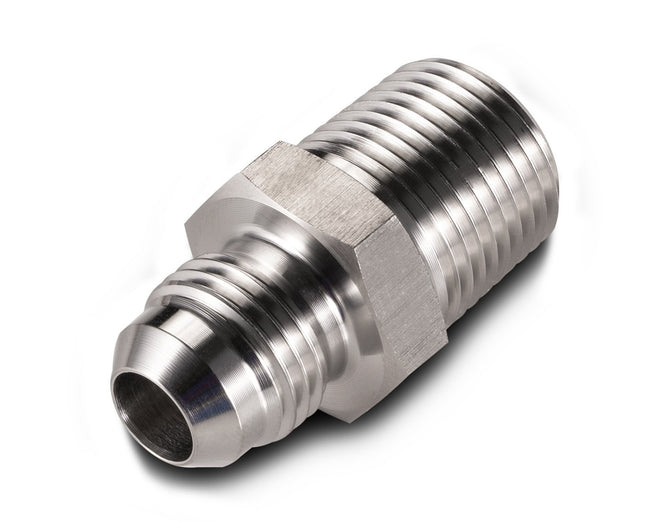

37 Degree MJIC X MNPT
BVV 37° MJIC X MNPT BVV™ brand stainless steel parts are made with precision 304 Grade Stainless Steel and are clean and free from burrs or debris. These stainless steel tube fittings are 37° JIC threads and NPT threads (National Pipe Taper) and will compress against other Female/Male NPT threads creating a tighter and tighter connection. All NPT threads require thread sealant to create a watertight and gas-tight seal between the threads. We recommend using Yellow Gas PTFE Tape because it is rated for gases and is UL listed and it is NOT recommended to use white PTFE tape because it is not rated for gas service. **NOTE: Pre-Taped option comes from BVV Pre-taped with Yellow UL Listed Gas PTFE Tape on the Male NPT threads ONLY for a +0.50c charge per male npt end. (JIC Threads DO NOT need to be taped.) The 37° JIC connection will create a seal by compressing the flared end against an opposite female/male flared connection. JIC connections do not require thread sealant because they seal off the flared surface of the fitting JIC Fittings are also not the same size as NPT fittings but do have the same size nomenclature. When connecting JIC fittings to one another it is recommended by BVV™ to use 2 wrenches - 1 to tighten the fitting and 1 to hold back against the force applied to create resistance and ensure a better seal. A MJIC X MNPT connector will convert and adapt a Female NPT connection to a Male JIC connection or vise-versa. These MJIC x MNPT stainless steel tube fittings are the industry standard for extraction systems and allow a multitude of configurations on any system. BVV™ MJIC x MNPT - Data Sheet Specifications Material 304 Stainless Steel Connection Type(s): 1/4" 37° MJIC (7/16-20) 3/8" 37° MJIC (9/16-18) 1/2" 37° MJIC (3/4-16) 3/4" 37° MJIC (1-1/16 - 12) 1" 37° MJIC (1-5/16 - 12) 1/4"-18 MNPT 3/8"-18 MNPT 1/2"-14 MNPT 3/4"-14 MNPT 1"-11-1/2 MNPT
$5.50 - $22.00
-
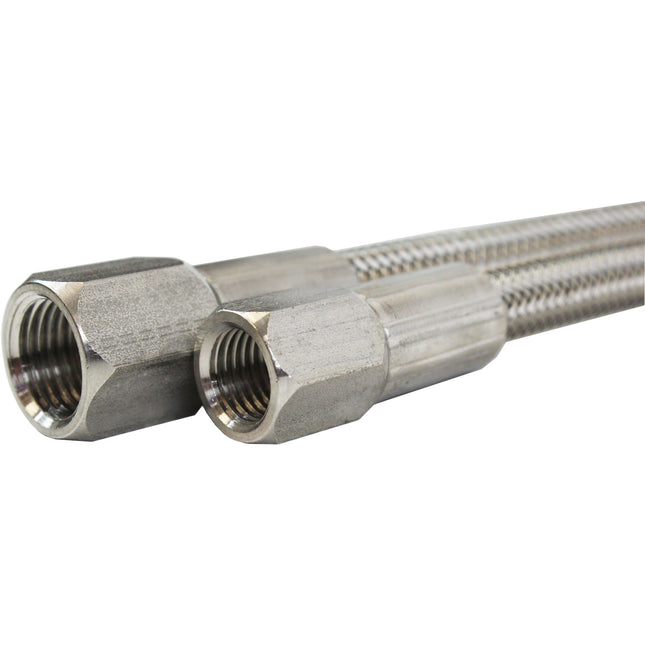
1/4" 37 Degree Female JIC Braided Stainless Steel Hose
1/4" 37° Female JIC Stainless Steel PTFE Hose These chemically resistant PTFE braided hoses are a necessity when dealing with harsh chemicals or solvents and high-pressure applications. They provide a uniquely rugged, durable, and chemically resistant combination of Stainless Steel and PTFE by having an inner core of PTFE and protecting that with a braided stainless steel outer sleeve. These hoses have female JIC swivel on each end and they DO NOT require Teflon tape to create a seal and they should always be tightened and untightened using 2 wrenches. ***Note: Do not exceed the specified hose bend radius or the inner PTFE liner will kink and the hose integrity will become compromised and should not be used. Stainless Steel Hose Technical Data Sheet Specifications: Connection Type(s): 1/4" 37° Female JIC Swivel (7/16-20 Thread) Liner Material PTFE (Teflon) Braid Material 304 Stainless Steel Swivel Material 304 Stainless Steel Temperature Rating -94°F to 500°F (-70°C - 260°C) Pressure Rating 2100 PSI Chemical Resistance Excellent Max Bend Radius 3"
$38.00 - $105.00
-
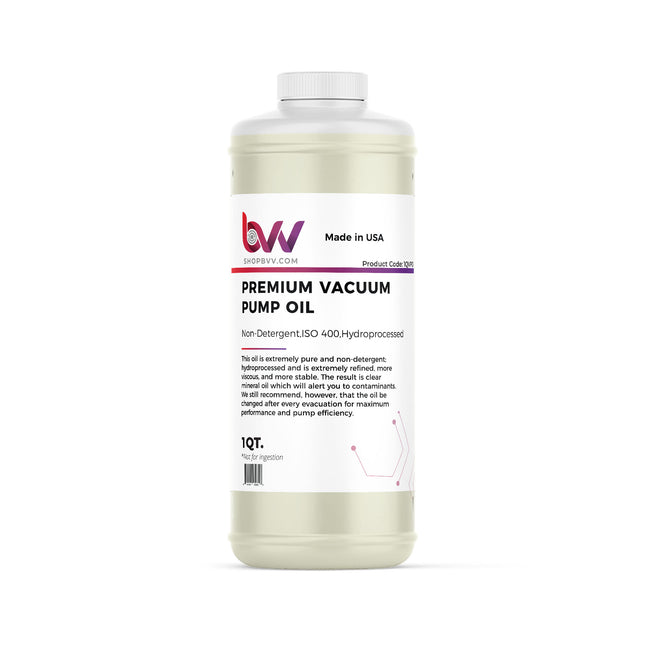

Premium Vacuum Pump Oil
Premium Vacuum Pump Oil For Maximum performance and pump efficiency, change the oil after every evacuation. After evacuation, oil contains contaminants which limit pump efficiency. Premium vacuum pump oil can be used in any vacuum pump to maintain and prolong the life of the pump. Drain immediately after evacuation while pump is warm. Slowly add oil to top of "oil level" line. If oil is to low, you will hear the exhaust baffle chatter. If oil level is too high, excess oil will be blown out of the exhaust. Non detergent-Extra Pure-Hydroprocessed-ISO 400 BVV Vacuum Pump Oil Certificate of Analysis COA BVV Vacuum Pump Oil Safety Data Sheet SDS
$16.00 - $975.00
-
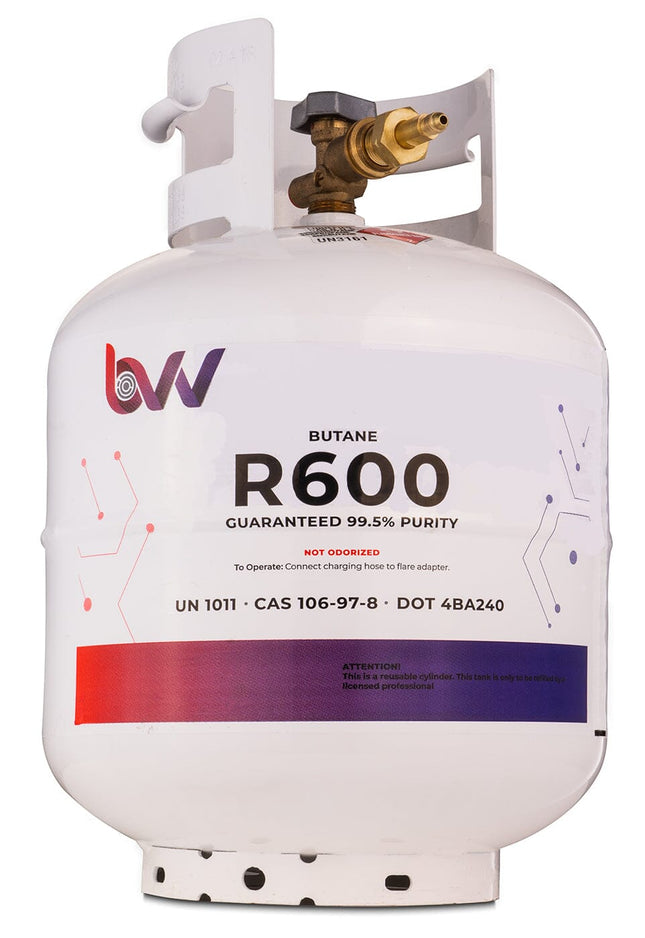

20LB High Purity USA N-Butane R600 - 99.5% Guaranteed - Buy 2 Get 1 Free (Add 3 To Cart)
20LB High Purity USA N-Butane R600 for Extraction - Buy 2 Get 1 Free (Add 3 To Cart) This solvent is instrument-grade and helps produce a higher quality extract through the reduction of mystery oils and contaminants. This N-Butane is colorless, odorless, and clean. Butane is commonly used for butane extractions which occurs in a closed-loop extraction system. Given that butane has a boiling point of 30.2F, it can easily be re-condensed without the use of extreme temperatures. This makes butane the solvent of choice for passive recovery. Butane tends to yield a more stable extract, as polar terpenes are left behind. Another benefit to butane for extraction is that Hydrocarbon extraction is often used in large production. Large amounts of material can be extracted at once, and because these solvents have such low boiling points, they can be distilled from the extract quickly, and without using high temperatures can degrade the product. These solvents are used for full plant extracts, and post-processing can yield various consistencies. This makes butane extraction a preferable method. DISCLAIMER(S): This unit is intended for LEGAL purposes only, to be used in accordance with local laws and ordinances. Use only in WELL VENTILATED AREAS! Notice: This item will ship via Ground ONLY. Quantities bought in 3 or more will ship via freight unboxed BVV™ always recommends distillation of every solvent before use. Tank contains no dip tube. Tank does not include CGA 510 fitting. Must be added through dropdown or bought separately. *Actual liquid weight is 20LB California now prohibits the retail sale of any Non-Odorized butane in quantities larger than 150ml. If you are not a retail purchaser you can call in to place an order. Permitted Sales Include the Following: Persons licensed to perform volatile solvent extraction activity under CA Bus & Prof Code Division 10 Manufacturers, wholesalers, resellers, or retailers solely for the purpose of resale Sourced right here in the USA, this high-quality butane is guaranteed to be 99.5% pure. This is a solvent that is instrument-grade and helps produce a higher quality extract through the reduction of mystery oils and contaminants. This butane is clean, colorless, odorless, and free of any hydrogen sulfide-based ethyl mercaptan odorants. Because of this, a finer, higher quality extract is consistently available to our customers. The solvent comes in a DOT transpiration approved tank. *Free of any hydrogen Sulphide based Ethyl Mercaptan Odorants. *This product is clean, colorless, and odorless. *Tank contains no dip tube. How To Buy 2 Get 1 Free Simply add 3X of 20LB Tanks to your cart and you will automatically be discounted the third tank. Need one with a CGA fitting two without? Simply add one tank with your desired CGA fitting and add two of the same item selecting "None" for the "CGA fitting" and "Connection Size" options. Want 2 Butane Tanks and 1 Propane Tank? No problem, just add 3 of ANY of our 20LB LPG tanks to your cart and enjoy the third tank free! *Actual N-butane liquid weight is 20LB Due to FAA regulations, solvent tanks cannot be safely transported via means other than ground. Any order that has solvent will not be shipped in an expedited fashion. If an order with solvent is combined with any other items and chosen to be expedited, that entire order will ship via Ground/Freight. We will not split up any orders and ship them separately. If a customer is wanting to expedite specific items and order solvent, 2 separate orders (1 for the solvent and 1 for the expedited items) will need to be placed in order to do so. Solvents do not ship to Hawaii, Puerto Rico, or any other US Territory outside of the contiguous 48 States. Shipping Solvent to Alaska may ONLY ship via freight and will be required to travel through Canada. We have this policy in place to ensure safety when transporting solvents, and to prevent any issue with shipping times for our customers. Chemical Formula: C₄H₁₀ Molecular Weight: 58.12 g/mol CAS Registry Number: 106-97-8 Appearance Colorless Odor: Faint Petroleum Density 2.6 kg/m³ (or 2.6 g/L) Boiling Point: 30.2 F (-1C) Solubility in water: Low Solubility GHS Pictograms: GHS Signal Word: Danger GHS Hazard Statements: H220 GHS Precautionary Statements P203, P210, P222, P280, P377, P381, and P403 UN Identification Number: 1011 Proper Shipping Name: Butane, liquefied Transport Hazard Class: 2.1 Packing Group: None DOT Placard: N-Butane Certificate of Analysis (COA) N-Butane Safety Data Sheet (SDS)
$265.00 - $280.00
-
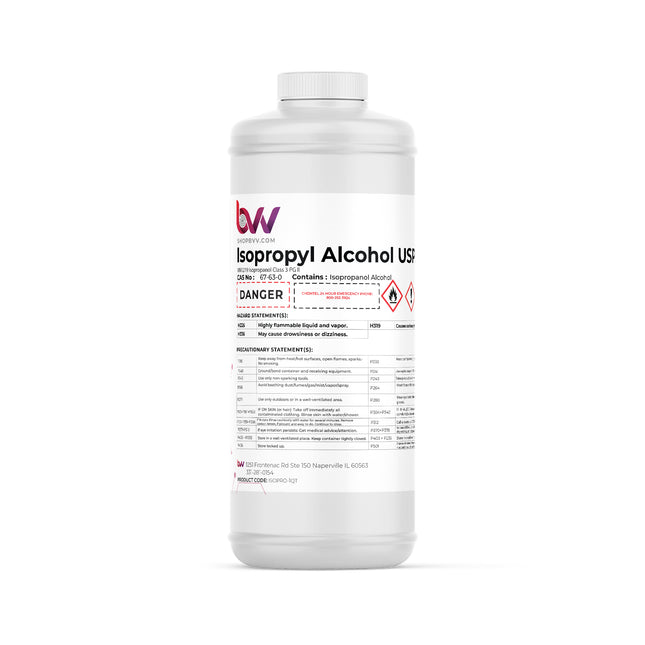

Isopropyl Alcohol 99% USP
Isopropyl Alcohol 99% USP Isopropyl alcohol, also known as 2-propanol or rubbing alcohol, is one of the most common alcohol solutions. The exact mechanism behind isopropanol’s disinfectant is not certain, however, it’s believed to kill cells through the process of denaturing cell proteins and DNA, dissolving cell lipoprotein membranes, and obstructing cellular metabolism. Isopropanol has a range of applications and uses across multiple industries, from medicine to cosmetics, and we explore this below. Cleaning Agent for Extraction, Laboratory, and Medical Industries In addition, 99% pure isopropyl alcohol serves as a cleaning agent for the laboratory, medical, and extraction industries. Mixed with water, this solution can be used as a rubbing-alcohol antiseptic. Quality solvents are vital for cleaning delicate electronics, extraction equipment, and other sensitive items. It also makes a perfect solution for surface disinfectant. 99% IPA evaporates cleanly and minimizes residual substances. Cleaning Agent for Home Care A truly versatile solution used in a variety of applications, isopropyl can also serve as a home cleaning remedy. For example, many window and toilet bowl cleaners contain isopropyl alcohol. rubbing alcohol can dissolve icky residues such as chewing gum, sap, hairspray, and other difficult compounds from hands, surfaces, and more. Other ways isopropyl can be used: Cleaning makeup brushes Cleaning blinds Cleaning sinks and chrome Deodorizing shoes Disinfecting computer mouse and keyboard Disinfecting mobile phone Dissolving windshield frost Getting rid of fruit flies Cleaning jewelry Creating homemade sanitizer Preventing ring around the collar Cleaning stainless steel Other Things to Note Spigots/Faucets are only compatible with 5 Gallon Jugs and must be purchased separately Isopropyl alcohol is a fast-evaporating solvent and industrial cleaning agent, intended for industrial or professional use only. It can be used as a solvent for gums, shellac, and essential oils. Can be used as a fuel additive. Isopropyl Alcohol (liquid) - 99.8% Purity Shelf Life - 5 years Specific Gravity - 0.79 Vapor Pressure - 1psi @ 20°C Flash Point - 12°C Boiling Point - 82°C *Disclaimer: 1 Quart Bottles are exempt from additional Hazmat shipping charges and can ship immediately, Less paperwork for shipping is required for shipping only 1 single bottle per order. Chemical Formula: C3H8O Molecular Weight: 60.096 g/mol CAS Registry Number: 67-63-0 Appearance Colorless Liquid Odor: Pungent Alcoholic odor Density 0.786 g/cm3 (20 °C) Boiling Point: 82.6 °C /180.7 °F Solubility in water: miscible GHS Pictograms: GHS Signal Word: Danger GHS Hazard Statements: H225, H302, H319, H336 GHS Precautionary Statements P210, P261, P305+P351+P338 UN Identification Number: 1219 Proper Shipping Name: Isopropanol Transport Hazard Class: 3 Packing Group: II DOT Placard: Isopropyl Alcohol Safety Data Sheet (SDS) Isopropyl Alcohol Certificate of Analysis (COA)
$20.00 - $3,400.00
-
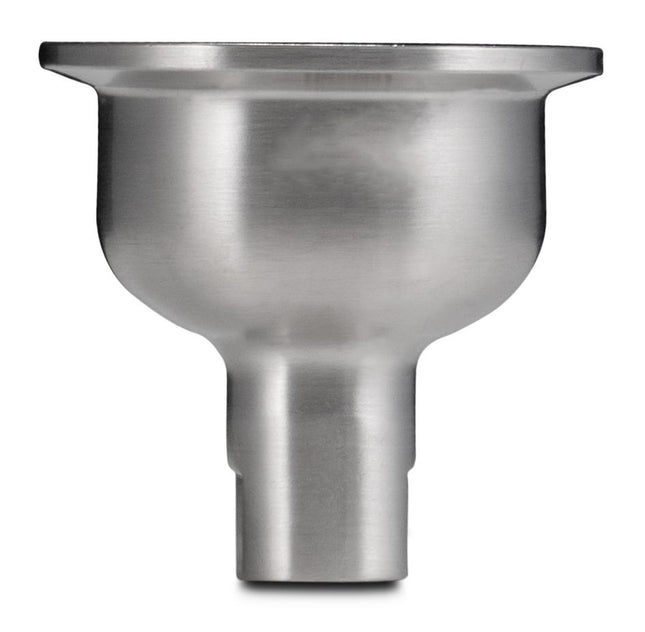

Hemispherical Tri-Clamp Reducers
Hemispherical Tri-Clamp Tri Clover Reducers Hemispherical Tri-Clamp reducers allow the user to connect differently sized Tri-Clamp parts to each other without adding to the overall size of your extraction system. These reducers are offered in Tri-clamp x Tri-Clamp and Tri-Clamp x Female NPT Specifications: Material: 304 Stainless Steel High Polish Interior Standard: 3A Connection Types : Tri-Clamp x Tri-Clamp and Tri-Clamp x FNPT
$33.00 - $185.00
-
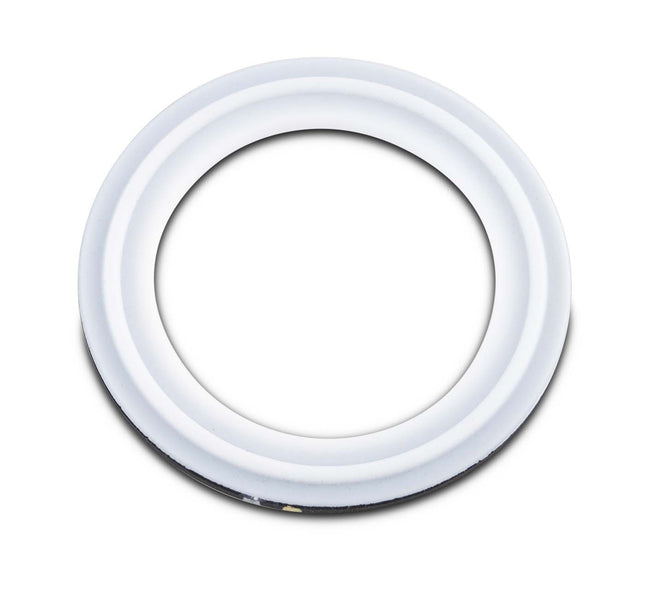

PTFE Envelope Tri-Clamp Gaskets with Viton Filler - USA Made
PTFE Envelope Tri-Clamp/Tri-Clover Gaskets with Viton Filler PTFE Envelope Tri-Clamp Gaskets are the only choice when needing extreme chemical resistance and temperature range. These gaskets are extremely unique in their construction because they have a Viton filler for compressibility surrounded by an 'Envelope' of PTFE which creates a unique combination of chemical resistance while providing an exceptional sealing characteristic. Normal solid PTFE gaskets are very tough to seal on their own and are usually not recommended in vacuum applications due to the gasket being very rigid because PTFE is not very compressible by itself. Tri-Clamp/ Tri-Clover Sanitary Fittings Gaskets create a pressure-tight seam between multiple stationary components, relying on a compression seal to prevent unwanted gas or liquid emissions. ***Note: Best Value Vacs ONLY recommends the use of PTFE Envelope gaskets with High Pressure clamps to ensure a positive seal on the system. Key Features: Excellent resistance to almost all chemicals Excellent Temperature Range Excellent Cleanability due to PTFE (Teflon) Envelope No Chemical Leaching Sizes Available: 1.5" 2" 3" 4" 6" 8" 10" 12" Chemical Compatibility: Material PTFE(Teflon)/Viton Filler(FKM) Color White/Black Connection Type Tri-Clamp Conformance U.S.P. CLASS VI COMPLIANCEPasses USP Class VI Cytotoxicity Testing and is suitable for high purity pharmaceutical grade applications.PTFE is FDA 21, 177,1550 compliant and the FKM(Viton) inner cores are FDA CFR 21, 177.2600 compliant. Thermal Properties: Low Temperature Range -100°F Minimum Continous Use (Static) -65°F Brittle Point -100°F High Temperature Range +400°F Maximum for Continous Use (Static) +400°F Chemical Compatibility: Butane A - Excellent Propane (liquified) A - Excellent Alcohols: Amyl A - Excellent Benzyl A - Excellent Butyl A - Excellent Diacetone A - Excellent Ethyl A - Excellent Hexyl A - Excellent Isobutyl A - Excellent Isopropyl A - Excellent Methyl A - Excellent Octyl A - Excellent Propyl A - Excellent BVV™ PTFE Gasket With Viton Filter - Data Sheet Disclaimer: BVV Recommends no more than a -40F Operating Temperature and is not responsible for the user running their system with incompatible chemicals.
$6.50 - $125.00
-
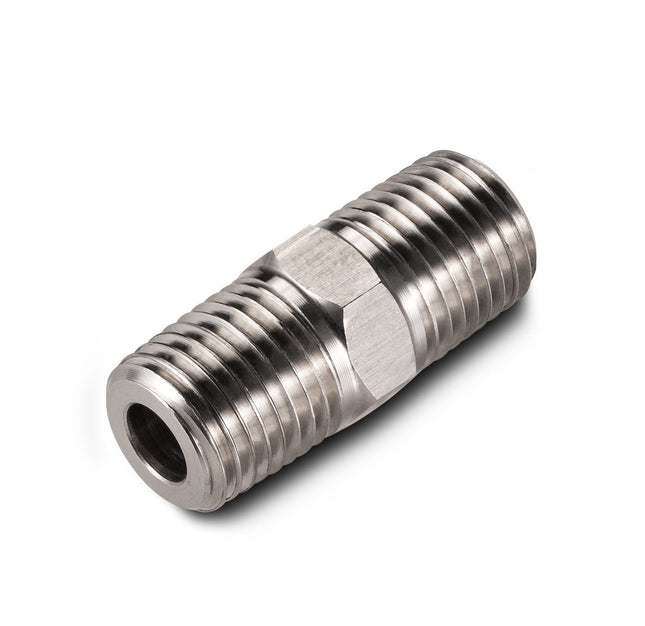

Hex Nipple
BVV™ Hex Nipple Pipe Fitting BVV™ brand stainless steel parts are made with precision 304 Grade Stainless Steel and are clean and free from burrs or debris. These fittings are NPT threads (National Pipe Taper) and will compress against other Female/Male NPT threads creating a tighter and tighter connection. All NPT threads require thread sealant to create a watertight and gas-tight seal between the threads. We recommend using Yellow Gas PTFE Tape because it is rated for gases and is UL listed and it is NOT recommended to use white PTFE tape because it is not rated for gas service. **NOTE: Pre-Taped option comes from BVV Pre-taped with Yellow UL Listed Gas PTFE Tape on the Male NPT threads ONLY for a +0.50c charge per male npt end. (JIC Threads DO NOT need to be taped.) Hex Nipples allow the user to connect 2 female NPT fittings together and also have the ability to put a wrench on the middle portion of the fitting because of the hex wrench section. BVV™ Hex Nipple - Data Sheet Specifications Material 304 Stainless Steel Connection Type(s): 1/4"-18 MNPT 3/8"-18 MNPT 1/2"-14 MNPT 3/4"-14 MNPT 1"-11-1/2 MNPT
$5.50 - $18.00
-
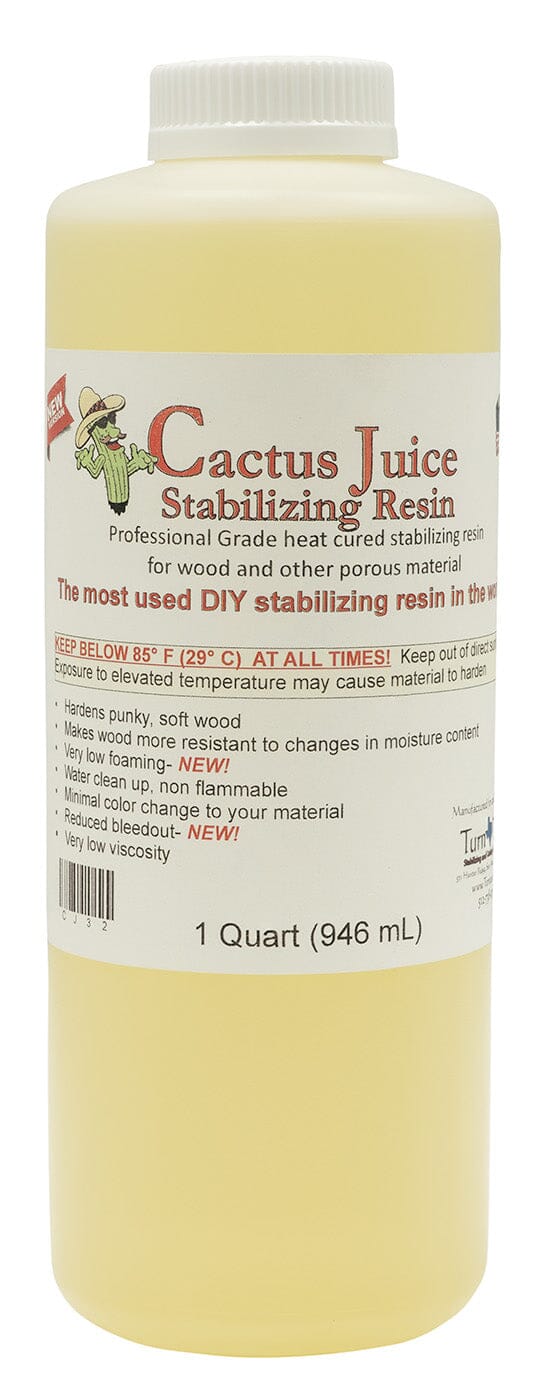

Cactus Juice Cactus Juice Stabilizing Resin for Woodworking
Cactus Juice Wood Stabilizing Resin Cactus Juice Stabilizing Resin is the original premium professional grade heat cured resin for stabilizing and hardening wood and other porous material. This makes the wood harder, and much more resistant to moisture. It is especially effective on those beautiful, punky, spalted woods that are just too soft to work with! Cactus Juice is easy to use and does not significantly change the color of most woods. It is NOT solvent-based and cures 99.99% from liquid to solid by weight, far superior to typical home stabilizing solutions such as Minwax Wood Hardener or polyurethane. Stop throwing away those punky blanks and give Cactus Juice a try! Cactus Juice MSDS Key Benefits: Stabilizes and hardens soft woods Minimal color change Lasts for months Reuse again and again Non-flammable Sizes Available: Pint Cactus Juice - Ready To Use 1 Quart Cactus Juice - Ready To Use 1/2 Gallon Cactus Juice - Activator Included 1 Gallon Cactus Juice - Activator Included UNCURED PROPERTIES Composition/type: methacrylate ester monomersAppearance/Color: translucent, very light amber liquidViscosity @25ºC : 4-6 cpsSpecific Gravity: 1.03Flash Point: >200ºFVapor Pressure: Less than 5mm Hg at 72° FFlorescence: No CURED PROPERTIES Appearance: hard, translucent, plasticHardness Shore D (ASTM D2240): 80-85 CURING METHOD Cactus Juice is heat cured at temperatures between 80ºC -96ºC, (177º F -205º F ). Cactus Juice cures when the temperature of the resin within the blank reaches 90º C for 6-8 minutes. The typical small shop method for curing is in a counter top toaster oven until internal blank temperature reaches the cure temperature for 10 minutes or more. This usually take 1-1.5 hours for a typical small batch of 10 pen blanks. Blanks with large cross section areas or larger batches of blanks may require longer processing times to achieve the required cure temperature. SERVICE TEMPERATURE RANGE Cactus Juice is formulated from the highest quality monomers to maximize the service operating range of the polymer. Cactus Juice is recommended for continuous service from –54ºC, (-65ºF) to 189ºC, (372ºF). STORAGE Activated Cactus Juice is easy to store and will exhibit an approximately 12 month shelf life under proper storage conditions. The resin should be stored in its original container and away from direct sunlight or other sources of UV light. Storage temperatures should be maintained below 29ºC (85ºF). Storage in a refrigerator is recommended. HANDLING ALL CHEMICALS SHOULD BE HANDLED WITH CARE!.Cactus Juice resin can be safely handled using normally accepted practices for handling non-toxic industrial chemicals. Rubber gloves should be worn when handling liquid Cactus Juice. Avoid excessive skin contact and wash thoroughly with water and mild soap if contact occurs. If dermatitis occurs, seek medical attention and avoid further exposure. Avoid accidental contact with the eyes by using safety glasses. If accidental contact with the eyes should occur, flush immediately with copious amounts of clean water and obtain medical attention as necessary. WASTE TREATMENT Cured Cactus Juice is inert and can be disposed of as ordinary industrial trash. Uncured resin should be cured before disposal. Resin in solution in wash water effluent is biodegradable. NOTES Information presented herein has been compiled from sources considered to be accurate and reliable, but is not guaranteed to be so. Nothing herein shall be considered as recommending practices or products in violation of any patent, law or regulation. It is the user's responsibility to determine the suitability of any material for a specific purpose and to adopt such safety precautions as may be necessary. TURNTEX, LLC MAKES NO WARRANTIES REGARDING THE PRODUCTS AND DISCLAIM ALL EXPRESS OR IMPLIED WARRANTIES, INCLUDING ANY WARRANTY OF MERCHANTABILITY OR FITNESS FOR A PARTICULAR PURPOSE.
$29.95 - $159.90
-
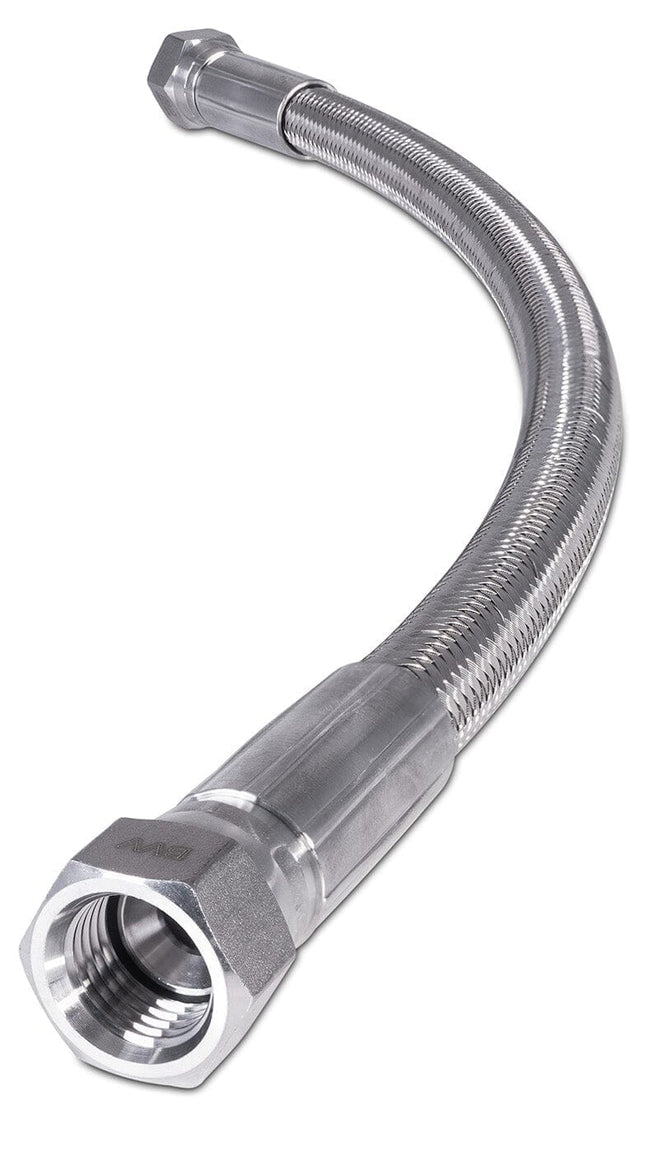

3/8" 37 Degree Female JIC Braided Stainless Steel Hose
3/8" 37° Female JIC Stainless Steel Braided PTFE Hose These chemically resistant PTFE braided hoses are a necessity when dealing with harsh chemicals or solvents and high pressure applications. They provide a uniquely rugged, durable, and chemically resistant combination of Stainless Steel and PTFE by having an inner core of PTFE and protecting that with a braided stainless steel outer sleeve. These hoses have female JIC swivel on each end and they DO NOT require Teflon tape to create a seal and they should always be tightened and untightened using 2 wrenches. ***Note: Do not exceed the specified hose bend radius or the inner PTFE liner will kink and the hose integrity will become compromised and should not be used. Stainless Steel Hose Technical Data Sheet Specifications: Connection Type(s): 3/8" 37° Female JIC Swivel (9/16-18) Liner Material PTFE (Teflon) Braid Material 304 Stainless Steel Swivel Material 304 Stainless Steel Temperature Rating -65° to 450°F Pressure Rating 1500 PSI Chemical Resistance Excellent Max Bend Radius 4"
$50.00 - $133.00
-


BVV 420ml Premium Tri-Blend Butane 99.999% Pure
BVV™ 420ml Premium Tri-Blend Butane 99.999% Pure DISCLAIMER(S): This unit is intended for LEGAL purposes only, to be used in accordance with local laws and ordinances. Use only in WELL VENTILATED AREAS! Due to FAA regulations, solvent tanks cannot be safely transported via means other than ground. Any order that has solvent will not be shipped in an expedited fashion. If an order with solvent is combined with any other items and chosen to be expedited, that entire order will ship via Ground/Freight. We will not split up any orders and ship them separately. If a customer is wanting to expedite specific items and order solvent, 2 separate orders (1 for the solvent and 1 for the expedited items) will need to be placed in order to do so. Solvents do not ship to Hawaii, Puerto Rico, or any other US Territory outside of the contiguous 48 States. Shipping Solvent to Alaska may ONLY ship via freight and will be required to travel through Canada. California now prohibits the retail sale of any NON-Odorized butane in quantities larger than 150ml. If you are not a retail purchaser you can call in to place an order. Permitted Sales Include the Following: Medical Collectives or Cooperatives operating under CA Health & Safety Code Section 11362.775 Persons licensed to perform volatile solvent extraction activity under CA Bus & Prof Code Division 10 Manufacturers, wholesalers, resellers, or retailers solely for the purpose of resale BVV™ Tri-Blend Premium Butane consists of 3 types of hydrocarbons in its blend resulting in a 99.999% purity rating. The hydrocarbons in this blend are 54% N-butane, 22% Propane, and 24% ISO-Butane. This premium canned butane is UK made and sourced from the North Sea and achieves a Grade A for the global standards of consumer products and backed by worldwide governing bodies of the following Quality Control institutions; BSI ISO9001:2008, British Retail Consortium Certification Body, SGS System Certification, UKAS, ANAB, and IAF. It comes in a 420ML can with ZERO impurities! Material Capacity Cylinder Volume Triclamp Spool (in) 1.5" 2" 3" 4" 6" 8" 10" 12" Length (in) 1" 2" 3" 4" 6" 8" 10" 12" 18" 24" 36" 48" Volume (in3) Select Material Butane ISO-Butane Propane How Much Will Fit in Cylinder FormulaVolume x Weight of Water x Specific Gravity ConstantsWeight of Water = 0.0360 (lbs / in3)Specific Gravity of = Lbs. of : Recommended: Account for an 80% fill to avoid a hydraulic lock How Much Material Will Fit in the Cylinder Packing Density (g) 2.5 3 3.5 4.3 Grams of Material Lbs. of Material
$5.50 - $240.00
-
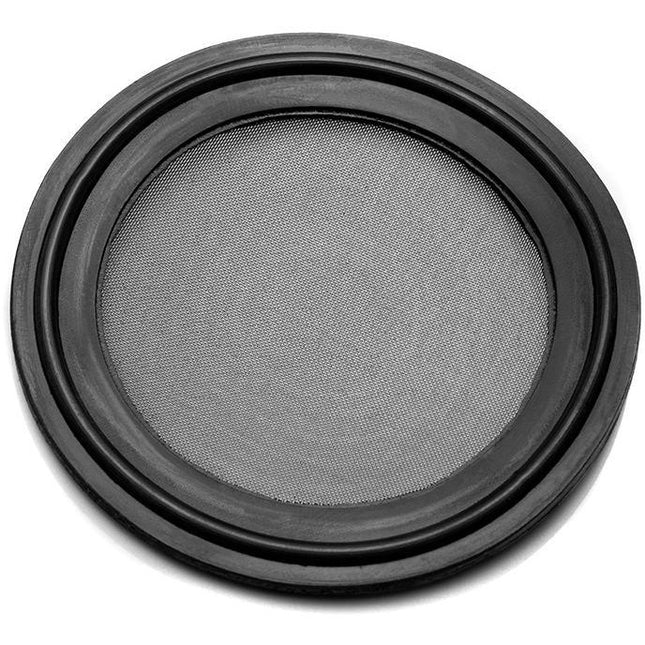
BUNA-N 150 Mesh (100 Micron)
BUNA-N 150 Mesh (100 Micron) Tri-Clamp/ Tri Clover Gasket MADE IN THE U.S.A Mesh / Micron Filter Chart Note: 'Cinnamon' Smelling Gaskets are Chinese made and are not standardized or regulated Disclaimer: BVV™ recommends no more than a -40F operating temperature and is not responsible for the user running their system with incompatible chemicals Why BUNA-N over Viton? Lower Temperature Range Lower Costs Better Compressibility and Springiness Excellent Resistance to Major/Popular Solvents(Butane/Propane) Better Tear Resistance Better Abrasion Resistance Specifications Materials: BUNA-N (Nitrile) 316 Stainless Steel Mesh Overmold Conformance FDA Compliant / Meets 3A Standards Thermal Properties: Low-Temperature Range: -70°F Minimum for Continuous Use(Static): -40°F Brittle Point: -70°F High-Temperature Range: +210°F to +250°F Maximum for Continous Use (Static): +250°F Gas Permeability: Excellent Durometer or Hardness Range: 20-95 Shore A Tensile Strength Range: 200-3,500 PSI Elongation Range(%): 350%-650% Abrasion Resistance: Excellent Resilience / Rebound: Good Chemical Compatibility Butane A - Excellent Propane A - Excellent Alcohols: Amyl B - Good Benzyl D-Severe Effect Butyl C-Fair Diacetone D-Severe Effect Ethyl C-Fair Hexyl A - Excellent Isobutyl B - Good Isopropyl B - Good Methyl A - Excellent Octyl B - Good Propyl A - Excellent
$21.00 - $150.00
-
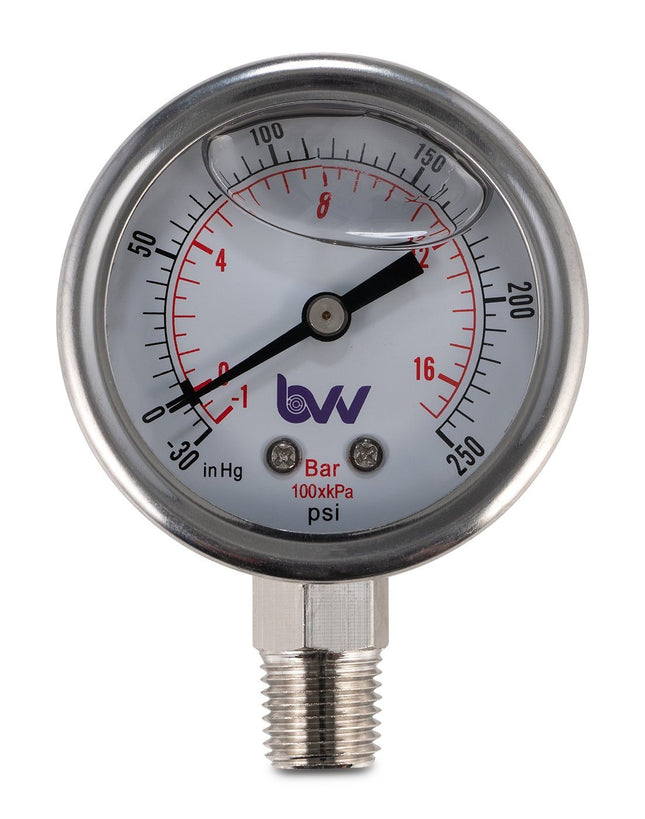
Glycerin Filled Compound Gauge with 1/4" NPT Base - (-30)-250 PSI
Glycerin Filled Compound Gauge with 1/4" NPT Base - (-30)-250 PSI BVV™ Glycerin filled compound gauge has a 1/4" MNPT stainless steel connection with a readout of (-30)-250 PSI. Use a compound gauge when measuring a system that is pushing both positive and negative pressure on the gauge. BVV™ Compound Gauge - TDS
$30.00
-
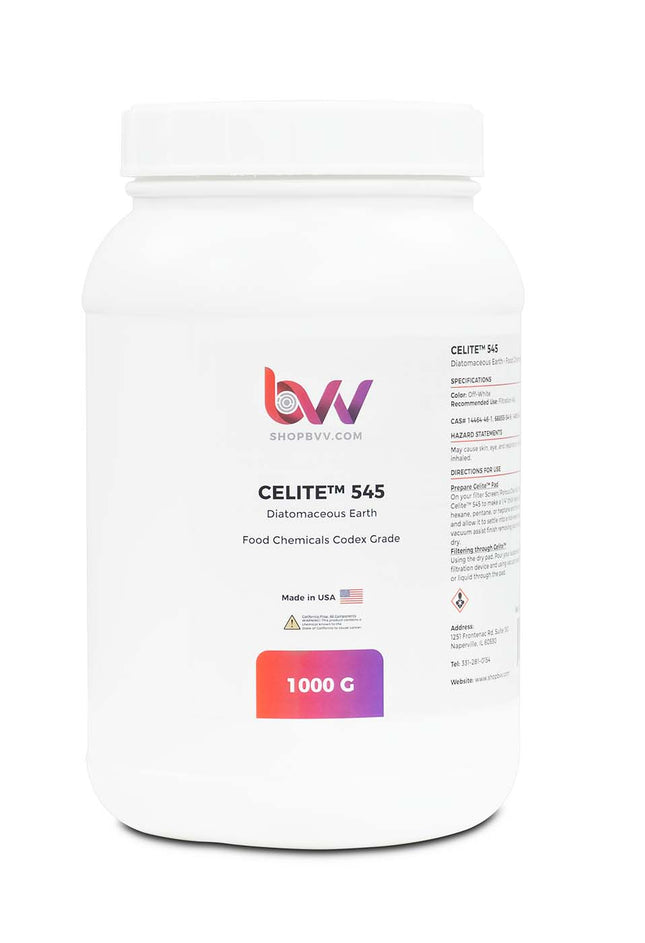

Celite® 545 Diatomaceous Earth (Food Codex Grade) 4.5 Micron
Celite® 545 Food Codex Chemicals Grade Filters down to 4.5 microns BVV™'s Celite 545 grade is Food Codex Grade and is approved for use as a filtering and processing aid in the Food Industry & is Made in the USA. Celite 545 is a formulation of Diatomaceous Earth that is used as a filtration aid for the pre-processing of distillate. Diatomaceous earth is considered skeletal remains of single-celled algae/diatoms formed due to sedimentary deposits. This filtration aid is used in laboratory settings and is a surface-active filtration agent that causes abrasion and the adsorption of other materials such as plant lipids. Celite 545 or Diatomaceous Earth is also an effective, safe alternative to chemical pesticides. This ultra-fine powder should be used with the proper safety equipment and should not be inhaled due to the risk of causing respiratory damage. pH: 10 (10% in Water) 90Kg Size sold at 4x 50lb bags on a Mini-Pallet* Safety Data Sheet Technical Data Sheet Certificate of Analysis Note: Bulk Bags and Bulk sizes are non-stocked items and will be ordered as needed and carry a several weeks lead time and require a forklift or pallet jack
$16.00 - $5,100.00
-
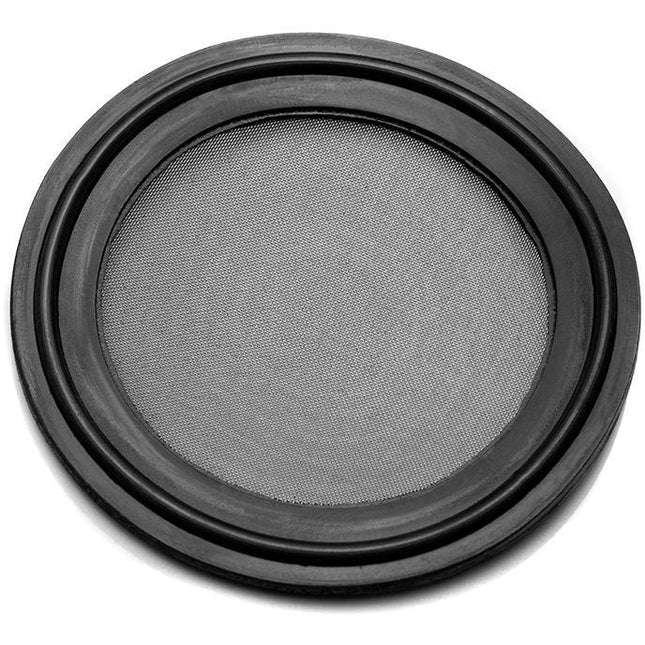
BUNA-N 100 Mesh (150 Micron)
BUNA-N 100 Mesh (150 Micron) Tri-Clamp Gasket MADE IN THE U.S.A Mesh / Micron Filter Chart Note: 'Cinnamon' Smelling Gaskets are Chinese made and are not standardized or regulated Disclaimer: BVV™ recommends no more than a -40F operating temperature and is not responsible for the user running their system with incompatible chemicals Why BUNA-N over Viton? Lower Temperature Range Lower Costs Better Compressibility and Springiness Excellent Resistance to Major/Popular Solvents(Butane/Propane) Better Tear Resistance Better Abrasion Resistance Specifications Materials: BUNA-N (Nitrile) 316 Stainless Steel Mesh Overmold Conformance FDA Compliant / Meets 3A Standards Thermal Properties: Low-Temperature Range: -70°F Minimum for Continuous Use(Static): -40°F Brittle Point: -70°F High-Temperature Range: +210°F to +250°F Maximum for Continous Use (Static): +250°F Gas Permeability: Excellent Durometer or Hardness Range: 20-95 Shore A Tensile Strength Range: 200-3,500 PSI Elongation Range(%): 350%-650% Abrasion Resistance: Excellent Resilience / Rebound: Good Chemical Compatibility Butane A - Excellent Propane A - Excellent Alcohols: Amyl B - Good Benzyl D-Severe Effect Butyl C-Fair Diacetone D-Severe Effect Ethyl C-Fair Hexyl A - Excellent Isobutyl B - Good Isopropyl B - Good Methyl A - Excellent Octyl B - Good Propyl A - Excellent
$18.00 - $131.00
-


CDA-12A Denatured Ethanol n-Heptane
Ultra High Purity n-Heptane Denatured Ethanol - CDA 12A HAZMAT ITEMS ARE NON-REFUNDABLE. ALL SALES ARE FINAL (Note: Container style and color may vary) BVV's Ultra High Purity N-Heptane Denatured Ethanol (CDA 12A) is distinguished by its exceptional purity, Our CDA 12A formulation combines 95% Food Grade/USP/ACS 200 Proof Ethanol, derived from corn, with 5% high-purity N-Heptane. Adhering to stringent industry standards, ensuring it meets the precise requirements of our customers, our Ultra High Purity Heptane Denatured Ethanol excels across diverse applications widely adopted as an effective botanical extraction solvent and cleaning agent. Being that our Ultra High Purity Denatured Ethanol is made unfit for consumption when denatured with N-Heptane it is not subject to the Federal Excise Tax on alcohol saving you up to 72% without compromising on it suitability for top-tier extractions. Primarily utilized as pure ethanol in extraction processes, this solvent is favored for its cost-effectiveness and extraction efficiency. Reduce manufacturing costs and increase extraction efficiency with BVV's Ultra High Purity Heptane Denatured Ethanol. Key Features: Significantly Reduced Cost due to the absence of Federal Tax Produces Exceptional Quality Extractions Leaves No Residuals or Tastes Evaporates Completely in a Rotary Evaporator Chemical Formula: Ethanol C2H6ON-Heptane C7H16 Molecular Weight: 72.1057 CAS Registry Number: Ethanol 64-17-5N-Heptane142-82-5 Appearance Colorless Liquid Odor: Mint or acetone-like Density 0.7905g/cm³ Boiling Point: 78.5c/173.3F Solubility in water: Miscible GHS Pictograms: GHS Signal Word: Danger GHS Hazard Statements: H225, H319 GHS Precautionary Statements P210, P233, P240, P241, P242, P243, P261, P264, P271, P280, P303+P361+P353, P304+P340, P305+P351+P338, P312, P337+P313, P370+P378, P403+P233, P403+P235, P405, P501 UN Identification Number: 1987 Proper Shipping Name: Alcohols, N.O.S Transport Hazard Class: 3 Packing Group: I DOT Placard: What is Denatured Ethanol? Denatured ethanol, also known as denatured alcohol, is ethanol (ethyl alcohol) that has been rendered unfit for human consumption by the addition of denaturants. Denaturants are typically chemicals that make the ethanol taste bad or have toxic effects, and they are added to discourage people from drinking the substance. The denaturation process is done to avoid the high taxes and regulations associated with beverage alcohol, as denatured ethanol is intended for industrial, pharmaceutical, or cosmetic uses rather than for consumption. Common denaturants include heptane, methanol, isopropyl alcohol, acetone, and other chemicals. Denatured ethanol is widely used in various industries, such as in the production of paints, solvents, cleaning products, and as a fuel for alcohol burners. Why is Ethanol Denatured? Ethanol is denatured, or rendered undrinkable, for several reasons: Tax Purposes: Denaturing ethanol allows for the imposition of lower taxes on industrial or non-beverage alcohol compared to potable alcohol. Governments often place higher excise taxes on alcohol intended for human consumption. Regulatory Compliance: Denaturing ethanol is a regulatory requirement to discourage the illegal diversion of tax-free industrial alcohol for beverage use. The addition of denaturants makes it unpalatable and unsafe for consumption. Public Safety: Making ethanol undrinkable helps prevent accidental or intentional ingestion of industrial alcohol, which can be toxic. Denaturing agents are chosen to deter people from attempting to use denatured alcohol as a substitute for beverage alcohol. Industrial Use: Denatured ethanol is widely used in various industries, including pharmaceuticals, cosmetics, and manufacturing. It serves as a solvent, fuel, or raw material in these applications. Common denaturants include substances like heptane, methanol, isopropanol, and various chemicals that make the alcohol unsuitable for human consumption while maintaining its usability in industrial processes. The specific denaturing formulations, such as CDA 12-A mentioned earlier, are defined by regulatory agencies to ensure compliance with safety and tax regulations. What is denatured ethanol used for? Denatured ethanol is used for various industrial and commercial purposes where the alcohol is needed for its properties but should not be consumed. Here are some common applications: Industrial Solvent: Denatured ethanol is widely used as a solvent in industries such as pharmaceuticals, cosmetics, and manufacturing. It is effective in dissolving a variety of substances. Cleaning Agent: Due to its solvent properties, denatured ethanol is used as a cleaning agent for surfaces, equipment, and machinery in industrial and commercial settings. Fuel Additive: Denatured ethanol is sometimes used as a fuel additive, especially in the blending of gasoline. It can improve combustion efficiency and reduce emissions. Paint and Coating Industry: It is used as a solvent in the formulation of paints, varnishes, and coatings. Pharmaceuticals: Denatured ethanol is used in the pharmaceutical industry for various purposes, including the extraction of medicinal compounds. Laboratory Use: In laboratories, denatured ethanol is often used for tasks like sterilization and as a solvent for experiments. Inks and Dyes: It is employed in the production of inks and dyes due to its ability to dissolve pigments. Adhesives and Sealants: Denatured ethanol is used in the formulation of adhesives and sealants. Window Cleaning: It is used in commercial window cleaning solutions. Automotive Industry: In the automotive industry, denatured ethanol is used for cleaning and degreasing. What can be used to denature ethanol? Here are examples of common Completely Denatured Alcohol (CDA) formulations used to denature ethanol: CDA 12-A To every 100 gallons of alcohol, add either: Five gallons of heptane or 5 gallons of toluene. CDA-19 To every 100 gallons of ethyl alcohol (not less than 160 proof), add: 4.0 gallons of either methyl isobutyl ketone, mixed isomers of nitro propane, or methyln-butyl ketone 1.0 gallon of either kerosene, deodorized kerosene, gasoline, unleaded gasoline, rubber hydrocarbon solvent, or heptane. CDA-20 To every 100 gallons of ethyl alcohol (not less than 195 proof), add a total of: 2.0 gallons of either unleaded gasoline, rubber hydrocarbon solvent, kerosene, or deodorized kerosene, or any combination of these. What does CDA mean? Completely Denatured Alcohol (CDA) is a type of denatured alcohol that has been rendered unfit for human consumption by the addition of denaturing agents. Denatured alcohol is ethanol (ethyl alcohol) that has been intentionally adulterated to make it toxic, foul-tasting, or otherwise undrinkable. This denaturing process is done to exempt the alcohol from excise duty and other taxes, as it's not intended for use in beverages. The denaturing agents used in CDA can vary, but they often include chemicals such as methanol, isopropanol, or other substances that make the alcohol unpalatable and potentially harmful if ingested. The specific formulation of denatured alcohol may be regulated by government authorities to ensure it meets safety standards and legal requirements. CDA is commonly used in industrial applications, as a solvent, fuel, or as a cleaning agent. It's important to note that due to the addition of denaturing agents, CDA should not be used for purposes that involve contact with the human body or ingestion. Safety precautions, including proper ventilation, should be followed when working with denatured alcohol. What is CDA 12A? CDA 12-A is a formulation specified by the Alcohol and Tobacco Tax and Trade Bureau (TTB) for Completely Denatured Alcohol (CDA). The formula is defined under §21.26 as Formula No. 12-A. The composition of CDA 12-A is as follows: For every 100 gallons of alcohol, add either: 5 gallons of n-heptane or 5 gallons of toluene. This denaturing process renders the ethanol unfit for consumption while meeting regulatory requirements for various industrial applications. CDA formulations, including CDA 12-A, are used to denature ethanol for purposes such as industrial solvents, cleaning agents, and manufacturing processes. Can you remove heptane from CDA 12A? When n-Heptane is added to ethanol it creates an azeotrope between the ethanol and n-heptane. An azeotrope is defined as a mixture of two liquids that have a constant boiling point and composition through distillation. This azeotrope results in the ethanol and n-heptane evaporating at the same temperature, making it extremely difficult to separate the two through distillation. While these azeotropic solvents are still easily recovered from a botanical extract at a relatively low boiling point around 78C/173F using a rotary evaporator or falling film evaporator, it is near impossible to separate the two via distillation. What is an Azeotrope? An azeotrope is a mixture characterized by having identical concentrations in both its vapor and liquid phases. This stands in contrast to ideal solutions, where one component is usually more volatile than the other, allowing for separation through distillation. When an azeotrope forms, the concentrations in both phases remain the same, hindering separation through traditional distillation methods. Azeotropes consist of a blend of at least two different liquids, and this mixture can exhibit either a higher or lower boiling point than either of its individual components. Azeotropes become relevant when certain liquid fractions resist alteration through distillation processes. In typical mixtures, components can be extracted using Fractional Distillation, a process involving repeated distillation stages. The more volatile component vaporizes and is collected separately, while the less volatile component remains in the distillation container, resulting in two distinct, pure solutions. BVV™ 710 Extraction Solvent Safety Data Sheet (SDS) Pure Ethyl Alcohol USP Product Data Sheet (PDS) CDA-12 with nHeptane Certificate of Analysis (COA)
$22.00 - $2,000.00
-
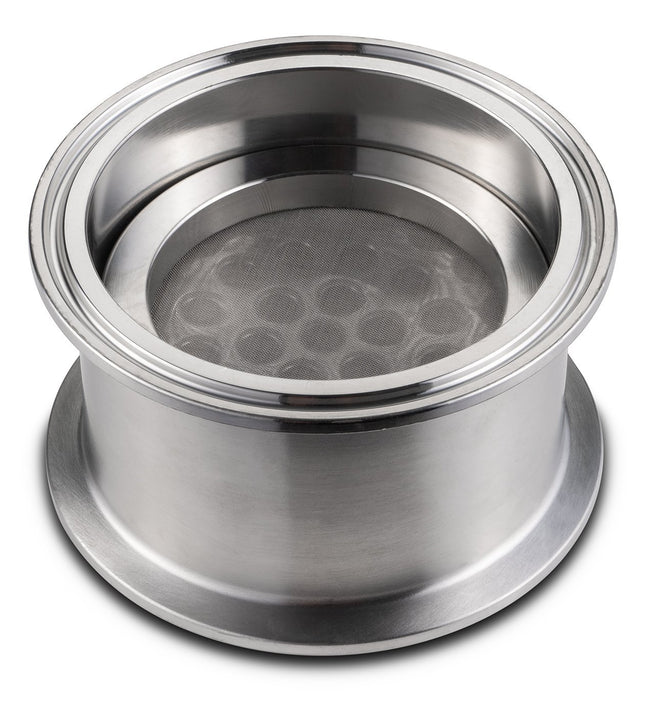

Tri-Clamp Filter Plate
Stainless Steel Tri-Clamp/ Tri Clover Filter Plate Stainless steel filter plates offer the user a great solid platform to help with filtration during the extraction process and they come standard with a 100 mesh (150 Micron) pre-cut stainless steel mesh filter media and a solid filter plate ring (unless otherwise specified). These filter plates can be used simultaneously with ashless filter papers or any other filtration media like stainless steel ball bearings or steel wool to increase surface and filtration level to remove fats, lipids, waxes and any other unwanted material during the extraction process. For 6" sizes and above, a high pressure clamp is recommended for all filtering applications. *Note: Does not include Clamp or Gasket. **Note: 8" Sizes come with a compression ring instead of a solid filter plate ring. Sizes Available: 1.5" - Includes Solid Filter Plate Ring 2" - Includes Solid Filter Plate Ring 3" - Includes Solid Filter Plate Ring 4" - Includes Solid Filter Plate Ring 6" - Includes Solid Filter Plate Ring 8" - Includes Standard COMPRESSION Ring 10" - Includes Solid Filter Plate Ring 12" - Includes Solid Filter Plate Ring Specifications Material 304 Stainless Steel Standard 3A High Polish Connection Type(s) Tri-Clamp Hole Diameter 5.8mm Height 2" Mesh Specs 100 Mesh (150 Micron) - 304 Stainless Steel BVV™ Tri-Clamp Filter Plate - Drawing
$33.00 - $280.00
-
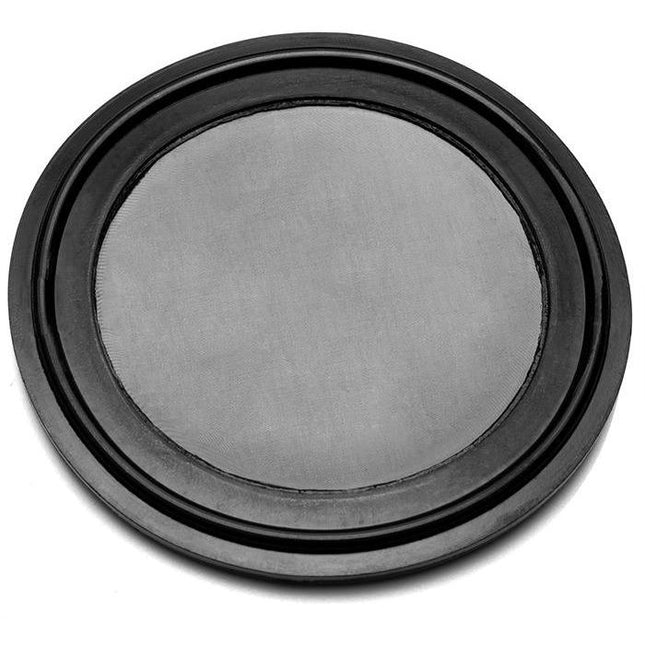
BUNA-N 2500 Mesh (5 Micron)
BUNA-N 2500 Mesh (5 Micron) Tri-Clamp/ Tri Clover Gasket MADE IN THE U.S.A Mesh / Micron Filter Chart Note: 'Cinnamon' Smelling Gaskets are Chinese made and are not standardized or regulated Disclaimer: BVV™ recommends no more than a -40F operating temperature and is not responsible for the user running their system with incompatible chemicals Why BUNA-N over Viton? Lower Temperature Range Lower Costs Better Compressibility and Springiness Excellent Resistance to Major/Popular Solvents(Butane/Propane) Better Tear Resistance Better Abrasion Resistance Specifications Materials: BUNA-N (Nitrile) 316 Stainless Steel Mesh Overmold Conformance FDA Compliant / Meets 3A Standards Thermal Properties: Low-Temperature Range: -70°F Minimum for Continuous Use(Static): -40°F Brittle Point: -70°F High-Temperature Range: +210°F to +250°F Maximum for Continous Use (Static): +250°F Gas Permeability: Excellent Durometer or Hardness Range: 20-95 Shore A Tensile Strength Range: 200-3,500 PSI Elongation Range(%): 350%-650% Abrasion Resistance: Excellent Resilience / Rebound: Good Chemical Compatibility Butane A - Excellent Propane A - Excellent Alcohols: Amyl B - Good Benzyl D-Severe Effect Butyl C-Fair Diacetone D-Severe Effect Ethyl C-Fair Hexyl A - Excellent Isobutyl B - Good Isopropyl B - Good Methyl A - Excellent Octyl B - Good Propyl A - Excellent
$34.00 - $168.00
-
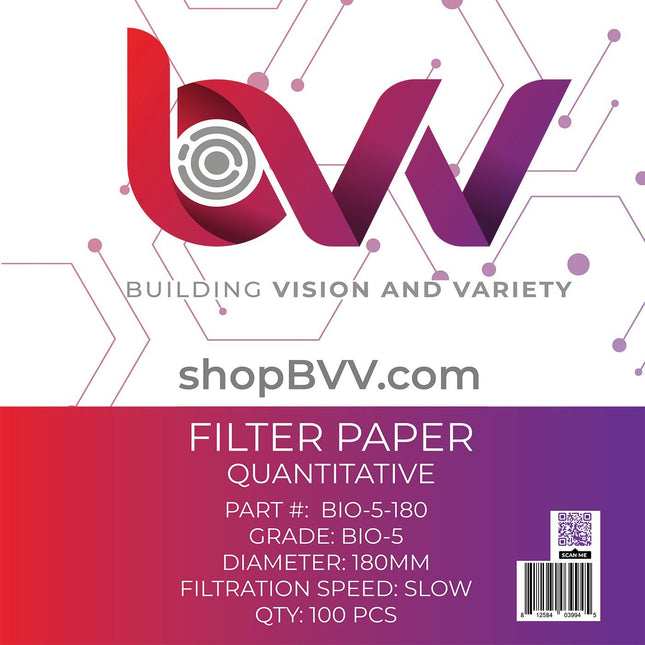

Ashless Filter Papers - 180MM - Quantitative
Ashless Filter Papers - 180MM - Quantitative Ashless quantitative and qualitative filter papers provide laboratory grade filtration for extraction systems and are specifically used in combination with a Buchner funnel to remove fats, waxes and any other unwanted contaminants from your solution. These filter papers are used in the pre-processing stage of short path distillation to clean up the material prior to processing. Key Features: ISO 9001 Approved Manufactured from alpha-cellulose and cotton linters High Purity and low background Consistent performance Low ashless content: <0.1% Whatman equivalent quality Pre-Cut for ease of use Specifications: Classification Qualitative Sizes Available: BIO-1 11um - Medium BIO-4 20um - Fast BIO-5 2.5um - Slow BIO-6 3um - Slow Ash Content <0.1% Quantity per Pack 100 Diameter 180mm (7.09") Technical Data: Grade Particle Retention Appearance Speed Ash Content (%) Basis Weight (g/m2) Wet burst (mm H2O) BIO-1 11um Smooth Medium <0.1 80.0±4.0 >140 BIO-2 8um Smooth Medium <0.1 80.0±4.0 >140 BIO-4 20um Smooth Fast <0.1 80.0±4.0 >120 BIO-5 2.5um Smooth Slow <0.1 80.0±4.0 >180 BIO-6 3um Smooth Slow <0.1 80.0±4.0 >180 BIO-40 8um Smooth Medium <0.007 80.0±4.0 >140 BIO-41 20-25um Smooth Fast <0.007 80.0±4.0 >120 BIO-42 2.5um Smooth Slow <0.007 80.0±4.0 >180 BIO-43 16um Smooth Medium to Fast <0.007 80.0±4.0 >120 BIO-44 3um Smooth Slow <0.007 80.0±4.0 >180
$50.00
-
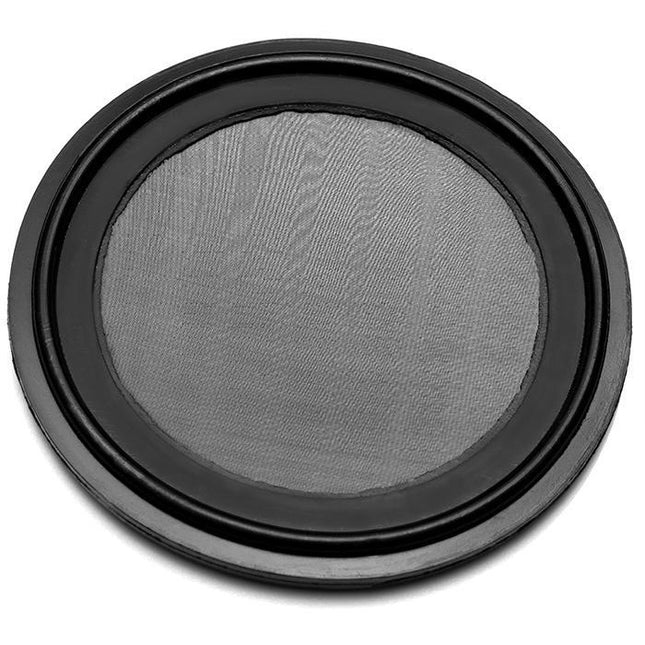
BUNA-N 550 Mesh (25 Micron)
BUNA-N 550 Mesh (25 Micron) Tri-Clamp/ Tri Clover Gasket MADE IN THE U.S.A Mesh / Micron Filter Chart Note: 'Cinnamon' Smelling Gaskets are Chinese made and are not standardized or regulated Disclaimer: BVV™ recommends no more than a -40F operating temperature and is not responsible for the user running their system with incompatible chemicals Why BUNA-N over Viton? Lower Temperature Range Lower Costs Better Compressibility and Springiness Excellent Resistance to Major/Popular Solvents(Butane/Propane) Better Tear Resistance Better Abrasion Resistance Specifications Materials: BUNA-N (Nitrile) 316 Stainless Steel Mesh Overmold Conformance FDA Compliant / Meets 3A Standards Thermal Properties: Low-Temperature Range: -70°F Minimum for Continuous Use(Static): -40°F Brittle Point: -70°F High-Temperature Range: +210°F to +250°F Maximum for Continous Use (Static): +250°F Gas Permeability: Excellent Durometer or Hardness Range: 20-95 Shore A Tensile Strength Range: 200-3,500 PSI Elongation Range(%): 350%-650% Abrasion Resistance: Excellent Resilience / Rebound: Good Chemical Compatibility Butane A - Excellent Propane A - Excellent Alcohols: Amyl B - Good Benzyl D-Severe Effect Butyl C-Fair Diacetone D-Severe Effect Ethyl C-Fair Hexyl A - Excellent Isobutyl B - Good Isopropyl B - Good Methyl A - Excellent Octyl B - Good Propyl A - Excellent
$26.00 - $170.00
-
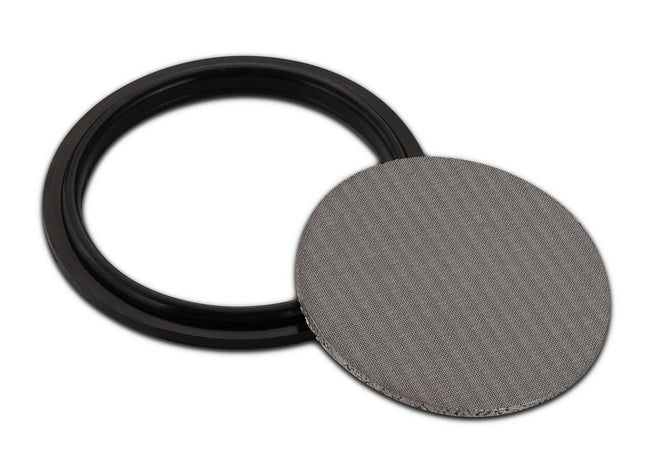

316L Stainless Dutch Weave Sintered Filter Disk 1 micron and up - BUNA-N
316L Dutch Weave Sintered Filter Disk **Note: This product comes with Filter Disk and Gasket ONLY. Filter Plate and Spool are NOT included. Recommended Filter plate click here. These 316L stainless steel dutch weave filter disks come with a custom made gasket to allow the user to insert filtration between clamping ends of any Tri-Clamp interface. The interface fits so snug, its inherent design prevents any blow-by. BVV™ 316L Dutch Weave Sintered Filter Disk - Data Sheet Pressure Ratings w/o any backing support; strait pipe connection: 1.5" 200PSI 2" 200PSI 3" 200PSI 4" 200PSI 6" 50PSI 8" 10PSI *Supporting Back Plate Required P# FP800-V3 10" 10PSI *Supporting Back Plate Required P# FP1000-V3 12" 10PSI *Supporting Back Plate Required P# FP1200-V3
$30.00 - $580.00
-
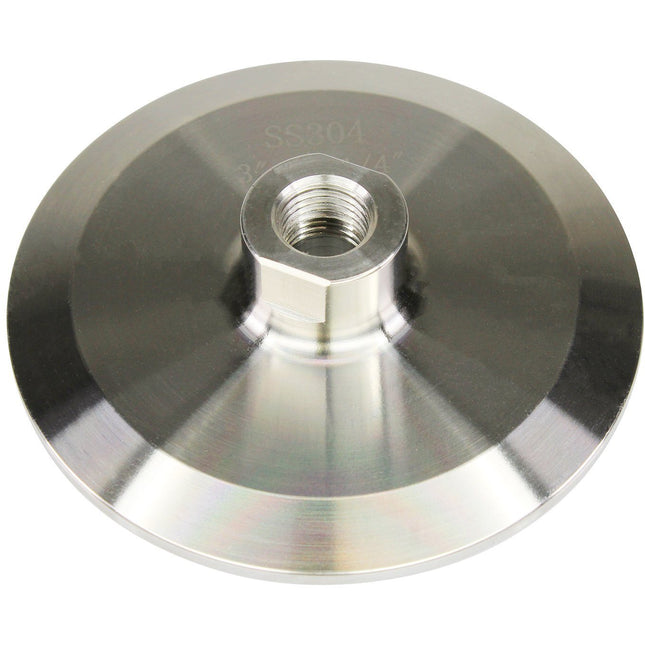
1/4" FNPT End Caps
1/4" FNPT End Caps These End Caps come with a 1/4"-18 FNPT Threaded connection welded to the end cap with a sanitary weld. They allow the user to adapt and connect a threaded connection to the 1/4" port on a Tri-Clamp/ Tri Clover lid Specifications Material 304 Stainless Steel Connection Type: Tri-Clamp 1/4" - 18 FNPT Standard: 3A Sizes Available: 1.5" 2" 3" 4" 6" BVV™ Solid 1/4" FNPT End Caps - Drawing BVV™ Solid 1/4" FNPT End Caps - End Cap Chart
$19.00 - $78.00
-
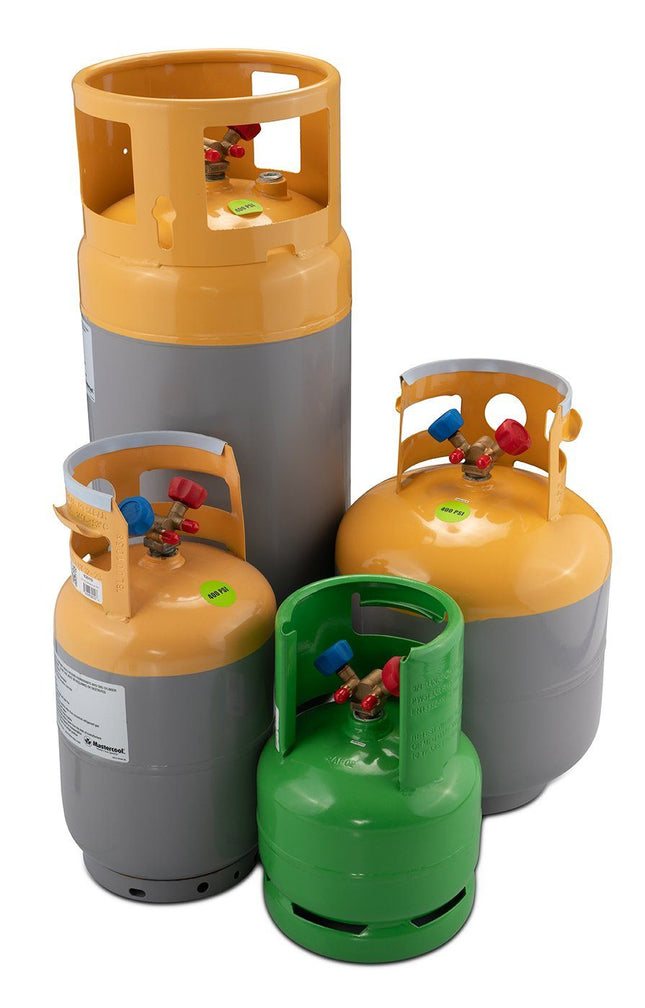

Mastercool DOT-Approved Recovery Cylinders
LP Carbon Steel Refrigerant Tank Carbon Steel LP Tanks are the best choice when storing solvents for the long term because of their reliability and inherent safety mechanisms. These tanks are the standard in LP storage and transportation because of their conformance to strict DOT guidelines and UL listings. They come pre-charged with nitrogen gas to help create a dry interior to inhibit the formation of rust on the interior of the tank. Note: When storing these tanks empty the user must either backfill them with nitrogen or maintain and full vacuum to prevent moisture from creating rust on the interior. ***Note: Tank comes charged with nitrogen and does not include solvent and the 1/4" flared connections do not require Teflon tape. Key Features: Valve Type: HVAC Y-Valve 1/4" SAE(Valve Rated for 5 Years) Service Pressure: 400 PSI 1/4" and 3/4" NPT Ports for float switch and other add-ons. Reusable and conforms to DOT-4BA400 specifications and ARI guidelines. The tank is Pre-Charged with Nitrogen gas to provide a clean, dry interior. High gloss powder coated finish for durability. Tank Sizes Available: 6L Mastercool 61010-EUGRN - (NOT DOT RATED) 30# 50# 100# 61010-EUGRN: Y-valve for liquid/vapor TPED approved Single valve for vapor TPED approved Raised collar for ease of handling and protection Tanks Conform to PED and ADR regulations CE and TÜV approved Used for storage and transport of refrigerant gases Size (w x h): 185 mm x 338 mm Standard Specification: ADR/RID2009, EN13322-IN D TUV 1 Service Pressure: 32 bar Air Tightness Pressure: 32 bar Bursting Volumetric Expansion Rate: >20% Tare Weight: 5.18 kg Nominal Water Capacity: 6 l Tank Test Pressure: 48 bar Bursting Pressure: >108 bar Body Material: HP295 1/4″ FL-M (7/16-20) connection Color: green Butane Capacity Calculation: All solvent tanks sold by Best Value Vacs have their capacity determined by this calculation and are based on industry standard nomenclature of the water weight tank # system because the specific gravity of water is 1.000 and the DOT 80% fill guideline. Example: 100# Tank = ~100lbs of water weight, Halfton Tank = 1000lbs of water weight. Tank # Water Weight in Lbs Specific Gravity of Butane 0.601 80% Fill Guidline 0.800 (Tank #) * (Specific Gravity of Butane) * ( 80% Fill Guildine) Specifications Tank/Component Material Carbon Steel/Brass Specifications Met D.O.T. 4BA, D.O.T. 4BW Connection Type(s) 1/4" (7/16-20) SAE Flared Butane Capacity: 6L 6lbs 30# 14.424 50# 24.040 100# 48.080
$110.00 - $375.00
-
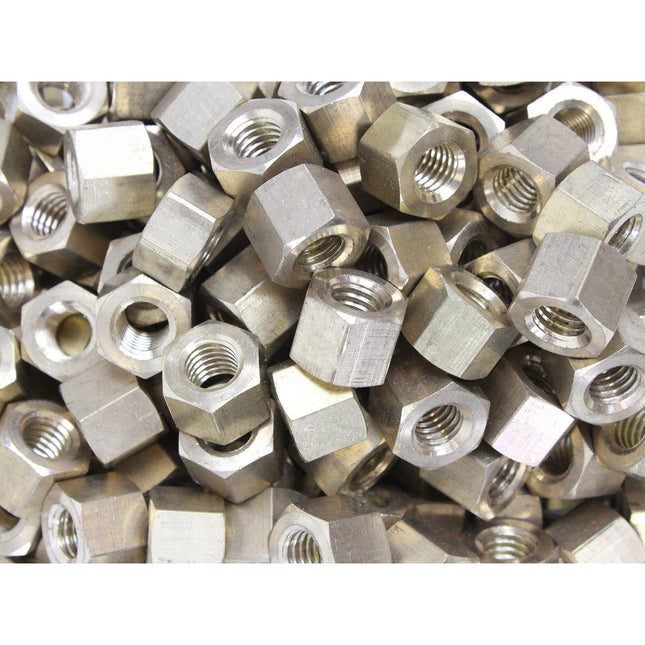
Brass Nuts For High Pressure Clamps
Brass Nuts for High Pressure clamps These are replacement nuts for High Pressure clamps and are made of brass and have a 5/8" Hex with a 3/8"-16 Threading. After repeated usage nuts on high pressure clamps will wear down and you will notice filings on the bolt when you notice this it is time to replace the bolts because they may fail unexpectedly.
$1.60
-
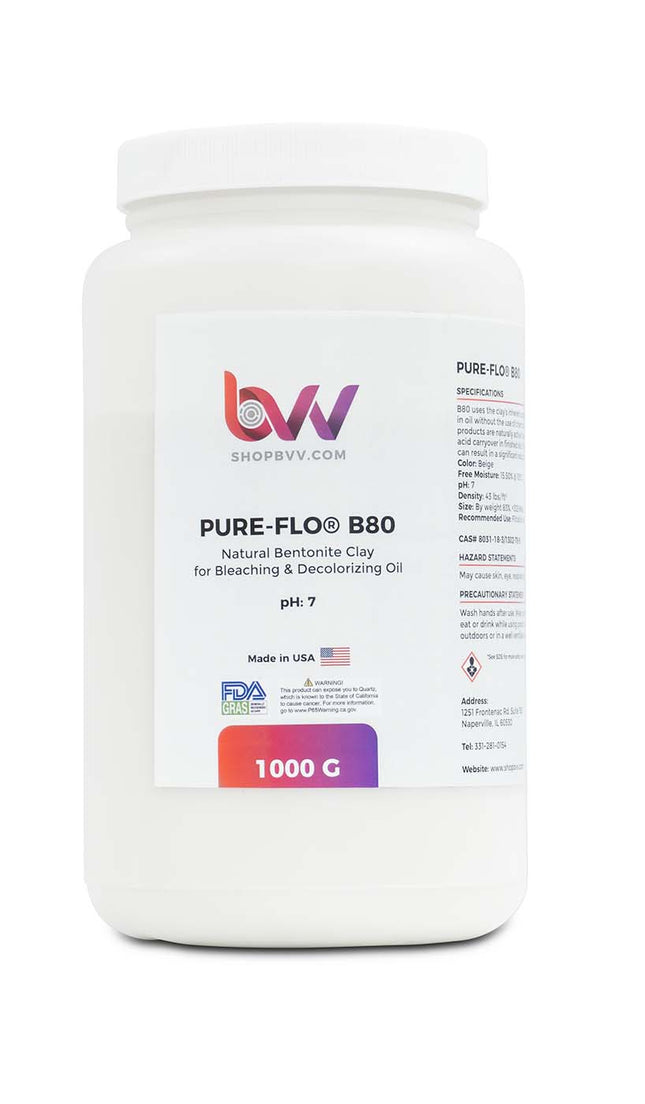

Pure-Flo® B80 Natural Bentonite for Bleaching & Decolorizing Edible Oils *FDA-GRAS
Pure-Flo® B80 Bentonite for Decolorizing Edible Oils and Fats What is “Pure-Flo® B80 Natural Bentonite for Bleaching & Decolorizing Edible Oils *FDA-GRAS Instead of removing oil contaminants with harsh chemical additives, our Natural Bentonite Clay B80 uses the clay's inherent properties to purify the targeted oil. This means that naturally-active B80 poses no threat of mineral acid carryover in any finished oil products while significantly reducing red coloring and adsorbing chlorophyll. As an example, a typical dosage of B80 (anywhere between 0.5% and 1.0%) during the bleaching and deodorizing process of sunflower oil can help achieve a great improvement in the color complexion by removing its red pigmentation. Our B80 Product’s Benefits and Features This bleaching/decolorizing adsorbent is widely-used during the pretreatment and processing of edible oils and fats. It’s considered to be cost-effective, natural, and of excellent value due to its effective color removal without any mineral acid carryover. ph Level: 7.2 FDA GRAS-Approved (Generally Recognized as Safe): This product is regarded to be safe for food processing, as long as it's not a part of the end product being consumed. NSF-HACCP: Prior to the changes in its down packing, this product was certified Kosher & Halal. However, it does not retain its certifications after considering its down packing. Unfortunately, BVV™ doesn't have an on-staff and on-site Rabbi or Imam to re-establish those certifications. We apologize to our patrons for the inconvenience. Shop all Solvents & Gas on BVV! Note: Container style and color may vary. Product is sold by weight which may result in the container not being full when received. Product Safety and Related Information Pure-Flo® Quality Standards and Certifications Pure-Flo globally delivers high-quality, natural bleaching products. “Our manufacturing process includes modern hygiene controls at every stage in the production of Pure-Flo products. Our controls follow the HACCP approach consistent with EU Regulations. The HACCP system used in our production process is certified by NSF, an independent certification organization. Pure-Flo products are also certified both Kosher and Hallal for use in food processing.” BVV™ Technical and Safety Data Forms B80 Technical Data Sheet B80 Safety Data Sheet Note: Bulk Bags and Bulk sizes are non-stocked items and will be ordered as needed and carry a several weeks lead time and require a forklift or pallet jack Note: Container style and color may vary. Product is sold by weight which may result in container not being full.
$22.00 - $2,200.00
-


Chromatography Silica Gel 60A 30-200μm (Made in Germany)
Chromatography Silica Gel 60Å Silica gel consists of a granular, porous form of silicon dioxide synthetically made from sodium silicate (source). DAVISIL® 60Å 30-200μm Chromatographic Silica Gel is suitable for use as packing for liquid chromatography normal phase separations with low operating pressures, a substrate for supporting surface functionalization, and as an adsorbent in continuous processes. The 60 Angstroms pore size is the correct pore size for color remediation for the Hemp industry. Silica gel can be used for the cleanup and purification of a wide range of synthetic and natural compounds. Silica Gel is non-toxic, non-flammable, non-reactive, and is stable with ordinary usage. Storage in a dry warehouse is recommended. Open packages should be resealed to prevent contamination of the product. The material in standard packaging should be used within 24 months from the date of production. Made in Germany Certification DIN EN ISO 9001 DIN EN ISO 14001 DIN EN ISO 50001 DAVISIL® Silica Gel 60A 30-200μm Technical Data Sheet DAVISIL®Silica Gel 60A 30-200μm Safety Data Sheet Note: Bulk Bags and Bulk sizes are non-stocked items and will be ordered as needed and carry a several weeks lead time and require a forklift or pallet jack
$50.00 - $10,560.00
-
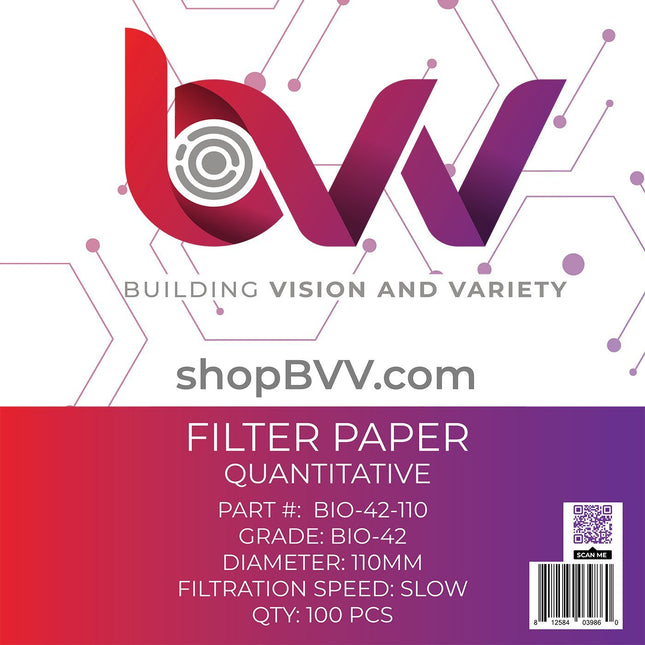

Ashless Filter Papers - 110MM - Quantitative
Ashless Filter Papers - 110MM - Quantitative Ashless quantitative and qualitative filter papers provide laboratory grade filtration for extraction systems and are specifically used in combination with a Buchner funnel to remove fats, waxes and any other unwanted contaminants from your solution. These filter papers are used in the pre-processing stage of short path distillation to clean up the material prior to processing. Key Features: ISO 9001 Approved Manufactured from alpha-cellulose and cotton linters High Purity and low background Consistent performance Low ashless content: <0.007% (Quantitative Filter Paper) Whatman equivalent quality Pre-Cut for ease of use Specifications: Classification Quantitative Sizes Available: BIO-40 8um - Medium BIO-41 20-25um - Fast BIO-42 2.5um - Slow BIO-44 3um - Slow Ash Content <0.007% Quantity per Pack 100 Diameter 110mm (4.33") Technical Data: Grade Particle Retention Appearance Speed Ash Content (%) Basis Weight (g/m2) Wet burst (mm H2O) BIO-1 11um Smooth Medium <0.1 80.0±4.0 >140 BIO-2 8um Smooth Medium <0.1 80.0±4.0 >140 BIO-4 20um Smooth Fast <0.1 80.0±4.0 >120 BIO-5 2.5um Smooth Slow <0.1 80.0±4.0 >180 BIO-6 3um Smooth Slow <0.1 80.0±4.0 >180 BIO-40 8um Smooth Medium <0.007 80.0±4.0 >140 BIO-41 20-25um Smooth Fast <0.007 80.0±4.0 >120 BIO-42 2.5um Smooth Slow <0.007 80.0±4.0 >180 BIO-43 16um Smooth Medium to Fast <0.007 80.0±4.0 >120 BIO-44 3um Smooth Slow <0.007 80.0±4.0 >180
$42.00
-

5' HVAC Hose
HVAC Vacuum Pump Hose with Swivel Fittings This Best Value Vacs 5' HVAC Hose has 1/4" swivel fittings on each end. HVAC hoses are built for long life and dependability. A strong, six-sided crimp provides a reliable connection between the hose and barb. The maximum working pressure of these hoses is 500psi with an ultimate burst pressure at 2500psi.
$15.00 - $16.00
-
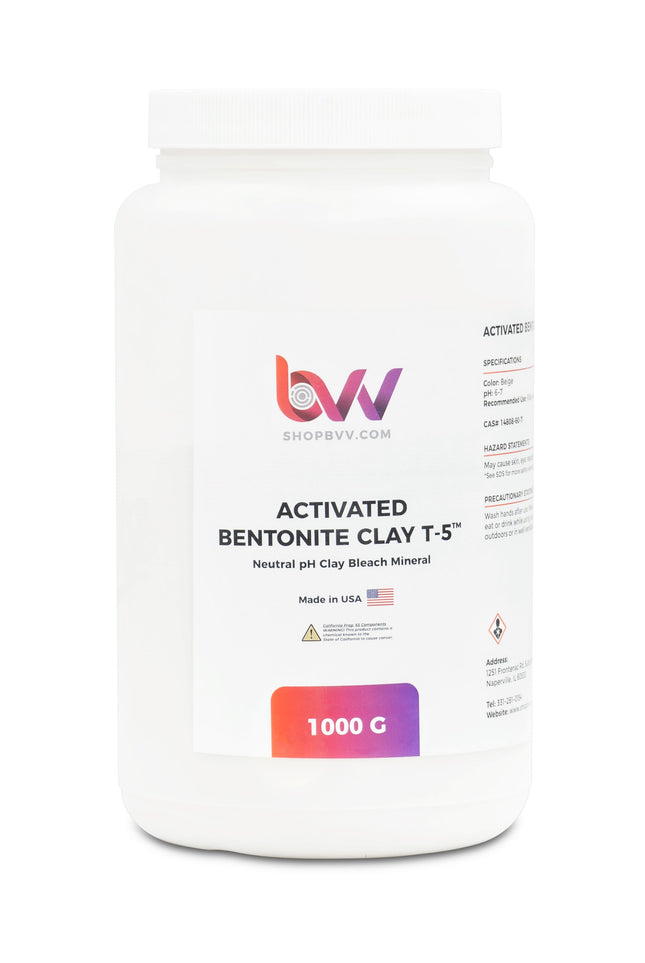

Activated Bentonite Clay T-5™
Activated Bentonite Clay T-5™ BVV™ activated Bentonite Clay T-5™ is a highly effective decolorizing agent for filter organic materials. This Clay is tan in color and is Heat Activated to help remove Anthocyanin pigments while preventing isomerization. This is a slow filtering media but will produce high clarity when used as a filter aid. pH:5 BVV™ Activated Bentonite Clay T-5™
$22.00 - $1,925.00
-


Dichloromethane (Methylene Chloride) Lab Grade
Dichloromethane (DCM) Lab Grade Tested 99.99% Purity (Aka. Methylene Chloride) Dichloromethane is an organochloride that appears as a colorless volatile liquid having sweet chloroform-like odor. This liquid is widely used as a solvent. Although it is not miscible with water, it is polar, and miscible with most organic solvents. Commonly used for partitioning alkaloids from aqueous solutions Dichloromethane or DCM for short is commonly used as an extraction solvent across the food & beverage industry and is well known for its use in the decaffeination of coffee. With a density of 1.33g/cm3 it is denser than water partitioning as the bottom layer during liquid-liquid extraction. With a low boiling point of 39.8C/103.3F Dichloromethane allows for fast drying and the preservation of temperature-sensitive compounds. While Dichloromethane is highly volatile it is actually neither flammable nor explosive in air. Produced through the chlorination of methane along with chloromethane, trichloromethane (chloroform), and tetrachloromethane (carbon tetrachloride, Dichloromethane is the least toxic of the three. While Dichloromethane is less toxic than other chlorinated hydrocarbons it is still known to cause skin and serious eye irritation and may cause drowsiness or dizziness and potentially cancer. During handling always wear appropriate personal protective equipment in the form of tightly fitting safety goggles or face shield, long-sleeved clothing, and an approved respirator if exposure limits are exceeded or if irritation or other symptoms are experienced. Always ensure DCM is handled under adequate ventilation using a chemical fume hood. Avoid getting DCM into the eyes, on skin, or on clothing, and avoid ingestion and inhalation. Dichloromethane should always be stored in a dry, cool, and well-ventilated place with the container tightly closed. Chemical Formula: CH2Cl2 Molecular Weight: 84.93 g·mol−1 CAS Registry Number: 75-09-2 Appearance Colorless Liquid Odor: Faint, Chloroform-like Density 1.3266 g/cm3 (20 °C) Boiling Point: 39.6 °C / 103.3 °F Solubility in water: 17.5 g/L (25 °C) GHS Pictograms: GHS Signal Word: Warning GHS Hazard Statements: H315, H319, H335, H336, H351, H373 GHS Precautionary Statements P261, P281, P305+P351+P338 UN Identification Number: 1593 Proper Shipping Name: Dichloromethane Transport Hazard Class: 6.1 Packing Group: III DOT Placard: What Is Dichloromethane? Dichloromethane, also known as methylene chloride, is a colorless, volatile, and sweet-smelling organic compound with the chemical formula CH2Cl2. It is a halogenated hydrocarbon and is commonly used as a solvent in various industrial and laboratory applications. What is Dichloromethane Used for? Dichloromethane, also known as methylene chloride, is a versatile organic compound with several common uses, including: Solvent: It is widely used as a solvent in various industrial and laboratory applications. Dichloromethane's ability to dissolve a wide range of organic compounds makes it valuable in chemical processes and as a cleaning agent. Extraction: It is used in some extraction processes, such as the decaffeination of coffee and tea. It can selectively dissolve caffeine from coffee beans or tea leaves, leaving behind other flavor compounds. Chemical Reactions: It is used in chemical reactions as a solvent and as a reagent in various synthetic procedures. Pharmaceuticals: In the pharmaceutical industry, dichloromethane can be used for various purposes, including as a solvent for drug formulation. Aerosol Propellant: It has been used as a propellant in aerosol products like paints and coatings. Foaming Agent: In the production of polystyrene foam, dichloromethane can be used as a foaming agent. Lab Applications: In laboratory settings, it is used as a solvent for analytical methods, especially in chromatography. What are the Properties of Dichloromethane? Dichloromethane, also known as methylene chloride, is a colorless, volatile liquid with several notable properties: Physical State: At room temperature (around 25 degrees Celsius or 77 degrees Fahrenheit), dichloromethane exists as a volatile liquid. It has a sweet, ether-like odor. Density: The density of dichloromethane is approximately 1.33 grams per milliliter (g/mL), making it denser than water. Solubility: Dichloromethane is highly miscible with a wide range of organic solvents, including ethers, alcohols, and chlorinated compounds. It exhibits limited solubility in water, forming an azeotrope with a maximum water concentration of around 12.5%. Boiling Point: It has a relatively low boiling point of approximately 39.6 degrees Celsius (103.3 degrees Fahrenheit), which makes it volatile and easy to evaporate. Reactivity: It is relatively chemically stable under normal conditions. However, dichloromethane can react with strong bases, such as sodium hydroxide, producing potentially hazardous compounds. Flammability: Dichloromethane is not highly flammable but can burn under certain conditions, particularly if it forms a vapor-air mixture within its flammable range. Toxicity: It is considered a hazardous chemical due to its potential health risks. Inhalation of dichloromethane vapors can lead to dizziness, headaches, nausea, and, in high concentrations, more severe health effects. Prolonged exposure can be harmful. Environmental Impact: Dichloromethane is known to be an ozone-depleting substance and can contribute to stratospheric ozone depletion. Consequently, its production and use are regulated or restricted in many countries under environmental laws. Industrial Use: Despite its potential hazards, dichloromethane is used in various industrial applications, such as paint stripping, as a solvent, and in the production of some chemicals and pharmaceuticals. What Are The Hazards Of Dichloromethane? Dichloromethane (DCM), also known as methylene chloride, is a volatile organic compound that poses several hazards to human health and the environment. It's important to handle DCM with care and follow safety precautions when working with this chemical. Here are some of the main hazards associated with dichloromethane: Inhalation Hazard: DCM is a volatile chemical, and its vapors can easily be inhaled. Short-term exposure to high concentrations of DCM vapor can lead to symptoms such as dizziness, headache, nausea, and in severe cases, loss of consciousness or death. Prolonged or repeated exposure to lower concentrations may cause respiratory irritation, coughing, and chest discomfort. CNS Depression: Dichloromethane can affect the central nervous system (CNS) when inhaled or absorbed through the skin. It has mild anesthetic properties and can lead to CNS depression, resulting in impaired coordination and reaction time. Skin and Eye Irritation: DCM can irritate the skin and eyes upon contact. It may cause redness, itching, and dermatitis. Eye contact can lead to irritation, tearing, and blurred vision. Carcinogenicity: Long-term exposure to DCM has been associated with an increased risk of cancer, particularly lung cancer. The International Agency for Research on Cancer (IARC) has classified DCM as a Group 1 carcinogen to humans. Environmental Impact: DCM is an ozone-depleting substance and can contribute to the depletion of the ozone layer when released into the atmosphere. It is also harmful to aquatic life, and its disposal into water bodies can have adverse effects on the environment. Flammability: While DCM itself is not highly flammable, its vapors can form flammable mixtures with air. It is important to take precautions to prevent the buildup of flammable vapor concentrations in enclosed spaces. Chemical Reactivity: DCM can react with certain chemicals, and its contact with strong oxidizers or alkalis can result in hazardous reactions. It should be stored and handled away from incompatible substances. To minimize the hazards associated with dichloromethane, it is essential to work with this chemical in a well-ventilated area, wear appropriate personal protective equipment (PPE), including gloves and eye protection, and follow safety guidelines and regulations. Use DCM in a chemical fume hood or a well-ventilated area to reduce inhalation exposure. Proper storage, handling, and disposal procedures should also be followed to protect human health and the environment. Additionally, it is advisable to be aware of local regulations and guidelines related to the use and disposal of DCM. How Do I Use Dichloromethane Safely? Using dichloromethane (DCM), also known as methylene chloride, safely is essential to minimize health and environmental risks associated with this chemical. Here are some guidelines for the safe use of DCM: Personal Protective Equipment (PPE): Wear appropriate PPE, including chemical-resistant gloves, safety goggles or a face shield, and a lab coat or chemical-resistant apron. Consider using a chemical-resistant apron and full-body protective clothing if handling large quantities of DCM. Ventilation: Work in a well-ventilated area, such as a chemical fume hood or a well-ventilated laboratory. Avoid working with DCM in confined spaces without proper ventilation. Respiratory Protection: If working with DCM outside of a fume hood or in a space with inadequate ventilation, use a NIOSH-approved organic vapor respirator to protect against inhalation exposure. Ensure that the respirator is fit-tested and properly maintained. Storage: Store DCM in a cool, well-ventilated area away from direct sunlight, heat, and incompatible materials. Keep containers tightly closed and labeled with hazard information. Handling: Use DCM only for its intended purposes and avoid unnecessary exposure. Handle DCM with care to prevent spills or splashes. Do not eat, drink, or smoke while working with DCM. Avoid Skin and Eye Contact: Wear chemical-resistant gloves to prevent skin contact. Use safety goggles or a face shield to protect your eyes from splashes. In case of skin contact, promptly remove contaminated clothing and wash the affected area thoroughly with soap and water. In case of eye contact, flush the eyes with water for at least 15 minutes and seek immediate medical attention. Work in a Controlled Environment: Perform DCM-related tasks on stable surfaces to prevent accidental spills. Avoid working alone when handling DCM, especially in situations where immediate assistance may be needed in case of an accident. Fire Safety: DCM is not highly flammable but can form flammable vapor-air mixtures. Keep ignition sources away from DCM and store it in a cool area. Ensure that fire extinguishing equipment is readily available and that personnel are trained in its use. Emergency Procedures: Know the location of emergency eyewash stations, safety showers, and spill response kits. Establish and familiarize yourself with emergency procedures in case of spills, fires, or exposure incidents. Disposal: Dispose of DCM waste according to local regulations and guidelines. DCM waste is often considered hazardous and must be handled and disposed of properly. Training: Ensure that personnel handling DCM are adequately trained in its safe use, storage, and disposal. Regulations and Guidelines: Be aware of and comply with local, state, and federal regulations governing the use, handling, and disposal of DCM. Remember that DCM is a volatile chemical, and its vapors can be harmful when inhaled over an extended period. Follow safety data sheet (SDS) instructions, and if you are uncertain about any aspect of using DCM safely, consult with a safety professional or chemical hygiene officer in your organization. Dichloromethane Specifications (Specs) Dichloromethane Safety Data Sheet (SDS) Dichloromethane Certificate of Analysis (COA)
$35.00 - $1,175.00
-
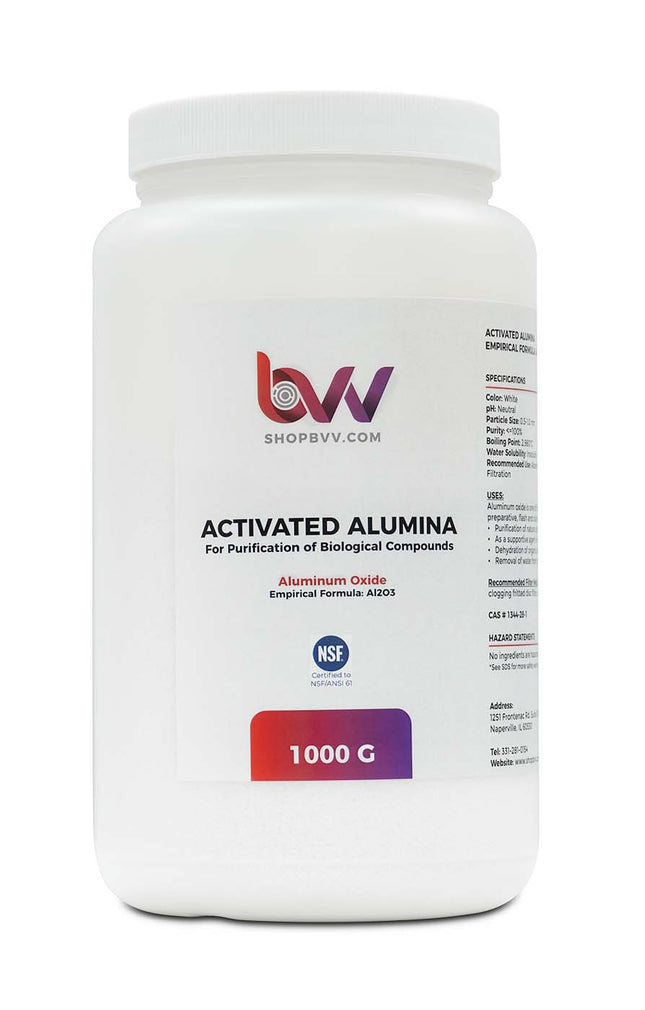

Activated Alumina
Activated Alumina Activated Alumina also known as aluminum oxide is one of the most adaptable sorbents for preparative flash and column chromatography. NSF 61 certified & Made in USA, Purity: <=100%. Based on 8% loss on Ignition. Activated Alumina SDS Sheet Activated Alumina Technical Data Sheet Key Uses: Purification of natural products & herbals As a supportive agent in aromatice chromatography Dehydration of organic solvents. Dehydration of organic solvents. Removal of water from non-polar solvents NSF 61 Certified: Guaranteed the product is free of harmful chemicals, and can be used in systems that humans come into contact consuming. Lot certificates can be available per request. Chemical composition (%) Al2O3 92 Na2O 0.35 SiO2 0.03 LOI (1000ºC) 8.0 Total pore volume, cc/g 0.52 0.52 Surface area, m2/g 380 Note: Bulk bags and Bulk sizes are non-stocked items and will be ordered as needed and carry a several week lead time and require a forklift or pallet jack Note: Container style and color may vary. Product is sold by weight which may result in container not being full.
$20.00 - $6,250.00
-
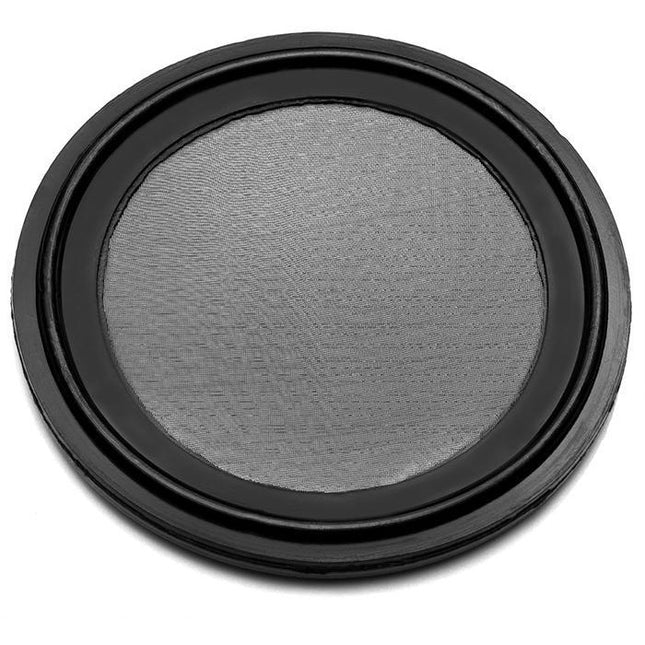
BUNA-N 300 Mesh (50 Micron)
BUNA-N 300 Mesh (50 Micron) Tri-Clamp/ Tri Clover Gasket MADE IN THE U.S.A Mesh / Micron Filter Chart Note: 'Cinnamon' Smelling Gaskets are Chinese made and are not standardized or regulated Disclaimer: BVV™ recommends no more than a -40F operating temperature and is not responsible for the user running their system with incompatible chemicals Why BUNA-N over Viton? Lower Temperature Range Lower Costs Better Compressibility and Springiness Excellent Resistance to Major/Popular Solvents(Butane/Propane) Better Tear Resistance Better Abrasion Resistance Specifications Materials: BUNA-N (Nitrile) 316 Stainless Steel Mesh Overmold Conformance FDA Compliant / Meets 3A Standards Thermal Properties: Low-Temperature Range: -70°F Minimum for Continuous Use(Static): -40°F Brittle Point: -70°F High-Temperature Range: +210°F to +250°F Maximum for Continous Use (Static): +250°F Gas Permeability: Excellent Durometer or Hardness Range: 20-95 Shore A Tensile Strength Range: 200-3,500 PSI Elongation Range(%): 350%-650% Abrasion Resistance: Excellent Resilience / Rebound: Good Chemical Compatibility Butane A - Excellent Propane A - Excellent Alcohols: Amyl B - Good Benzyl D-Severe Effect Butyl C-Fair Diacetone D-Severe Effect Ethyl C-Fair Hexyl A - Excellent Isobutyl B - Good Isopropyl B - Good Methyl A - Excellent Octyl B - Good Propyl A - Excellent
$23.00 - $163.00
-
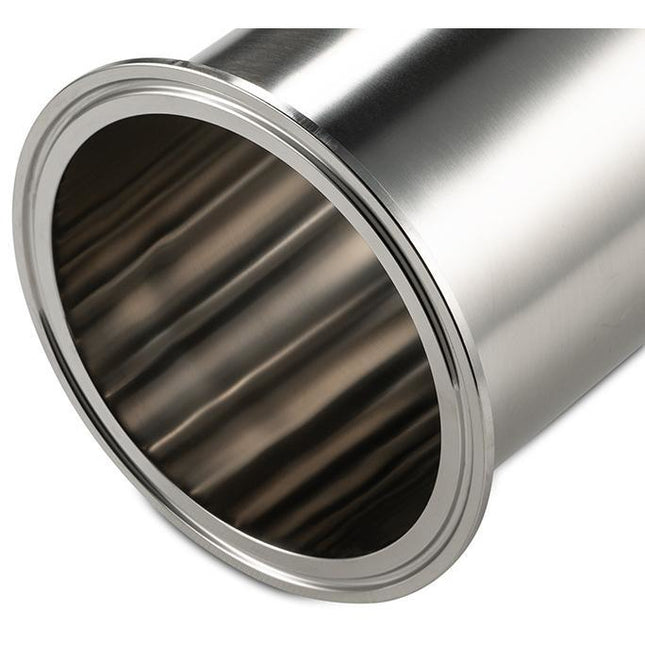
4" Tri-Clamp Spools
4" Tri-Clamp/ Tri Clover Spools Sizes Available: 4" x 2" Tri-Clamp Spool 4" x 4" Tri-Clamp Spool 4" x 8" Tri-Clamp Spool 4" x 12" Tri-Clamp Spool 4" x 18" Tri-Clamp Spool 4" x 24" Tri-Clamp Spool 4" x 36" Tri-Clamp Spool 4" x 48" Tri-Clamp Spool Specifications Tri-Clamp Size 4" Material 304 Stainless Steel Standard 3A High Polish Spool OD 4" Spool ID 3.834" Flange OD 4.682" Bead Center 4.344" OD = Outer Dimension ID = Inner DimensionDisclaimer to Customer: User assumes all responsibility and risks of the system for all Stainless Steel Parts bought separately to piece together a Closed Loop, Closed Column, or Open Blast Extractors. They DO NOT come with a standard 1 year system warranty, customer assistance on how to run your system, technical help or a guarantee of the system being tested. BVV™ 4" Tri-Clamp Spools - Drawing Material Capacity Cylinder Volume Radius (in) 1.5" 2" 3" 4" 6" 8" 10" 12" Length (in) Volume (in3) Select Material Butane ISO-Butane Propane How Much Will Fit in Cylinder FormulaVolume x Weight of Water x Specific Gravity ConstantsWeight of Water = 0.0360 (lbs / in3)Specific Gravity of = Lbs. of : Recommended: Account for an 80% fill to avoid a hydraulic lock How Much Material Will Fit in the Cylinder Volume Packing Density (g) 2.5 3 3.5 4.3 Grams of Material Lbs. of Material Cans of Butane Cans of Butae by Size Pounds of Butne mL fl oz lbs # of Cans 420 14.2 300 10.1 200 6.7 150 5.07
$25.00 - $145.00
-
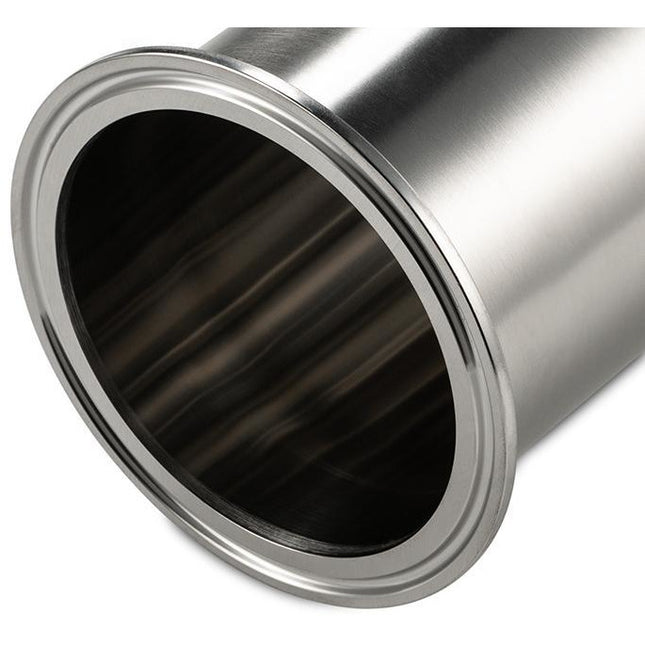
3" Tri-Clamp Spools
3" Tri-Clamp/ Tri Clover Spools Sizes Available: 3" x 2" Tri-Clamp Spool 3" x 6" Tri-Clamp Spool 3" x 9" Tri-Clamp Spool 3" x 12" Tri-Clamp Spool 3" x 18" Tri-Clamp Spool 3" x 24" Tri-Clamp Spool 3" x 36" Tri-Clamp Spool 3" x 48" Tri-Clamp Spool Specifications Tri-Clamp Size 3" Material 304 Stainless Steel Standard 3A High Polish Spool OD 3" Spool ID 2.87" Flange OD 3.579" Bead Center 3.281" OD = Outer Dimension ID = Inner Dimension Disclaimer to Customer: User assumes all responsibility and risks of the system for all Stainless Steel Parts bought separately to piece together a Closed Loop, Closed Column, or Open Blast Extractors. They DO NOT come with a standard 1 year system warranty, customer assistance on how to run your system, technical help or a guarantee of the system being tested. BVV™ 3" Tri-Clamp Spools - Drawing Material Capacity Cylinder Volume Radius (in) 1.5" 2" 3" 4" 6" 8" 10" 12" Length (in) Volume (in3) Select Material Butane ISO-Butane Propane How Much Will Fit in Cylinder FormulaVolume x Weight of Water x Specific Gravity ConstantsWeight of Water = 0.0360 (lbs / in3)Specific Gravity of = Lbs. of : Recommended: Account for an 80% fill to avoid a hydraulic lock How Much Material Will Fit in the Cylinder Volume Packing Density (g) 2.5 3 3.5 4.3 Grams of Material Lbs. of Material Cans of Butane Cans of Butae by Size Pounds of mL fl oz lbs # of Cans 420 14.2 300 10.1 200 6.7 150 5.07
$27.00 - $135.00
-
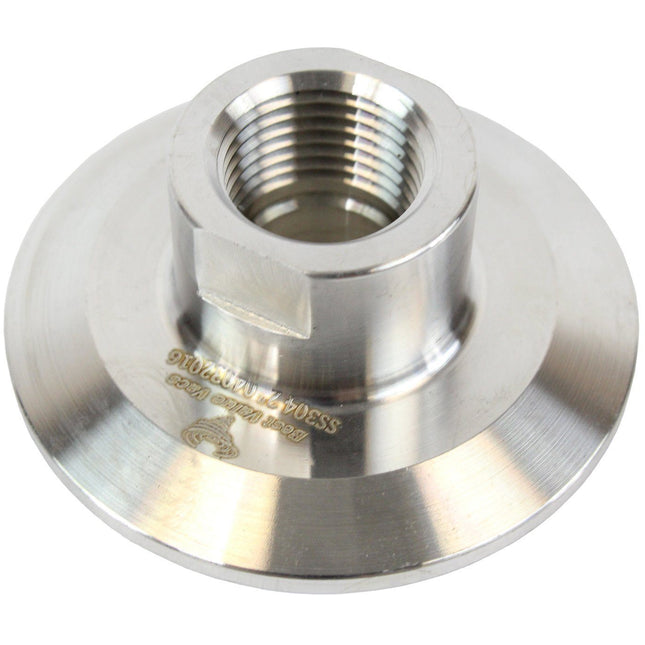

1/2" FNPT End Caps
1/2" FNPT End Caps These End Caps come with a 1/2"-14 FNPT Threaded connection welded to the end cap with a sanitary weld. They allow the user to adapt and connect a threaded connection to the 1/2" port on a Tri-Clamp/ Tri Clover lid. These 1/2" FNPT endcaps also provide the user with a larger diameter for gases or flow of liquid which can greatly increase run times for an extraction system. Specifications Material: 304 Stainless Steel Standard: 3A High Polish Connection Type(s): Tri-Clamp 1/2" - 14 FNPT Sizes Available: 1.5" 2" 3" 4" 6" BVV™ 1/2" FNPT End Caps - Drawing BVV™ 1/2" FNPT End Caps - End Cap Chart
$21.00 - $199.00
-
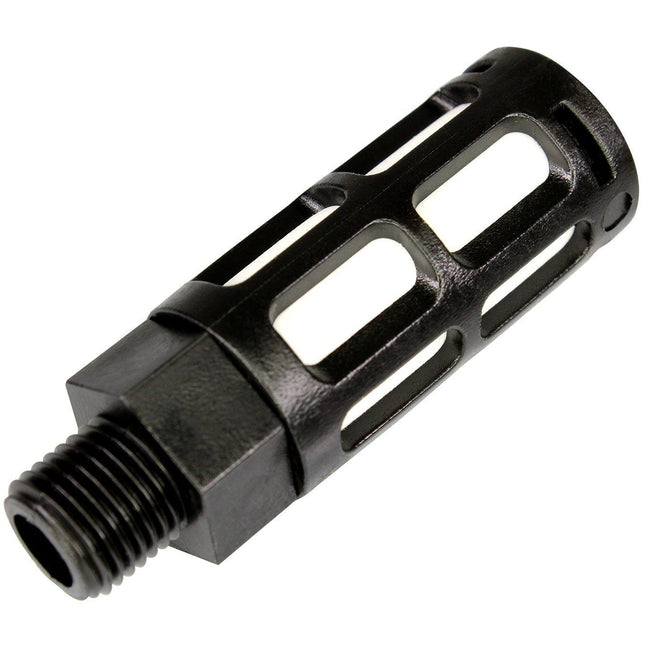
Vacuum Chamber 50 Micron Air Filter
Vacuum Chamber 50 Micron Air Filter This vacuum chamber air filter is designed to be used with Best Value Vacs, SVac, and Glass Vac vacuum chambers. It easily threads into the Female NPT side of the valve manifold and protects the contents inside of the chamber from having dust be sucked back into the chamber when vacuum is released because it will filter the incoming air. Quality replacement parts & fittings for vacuum chambers.
$6.00
-
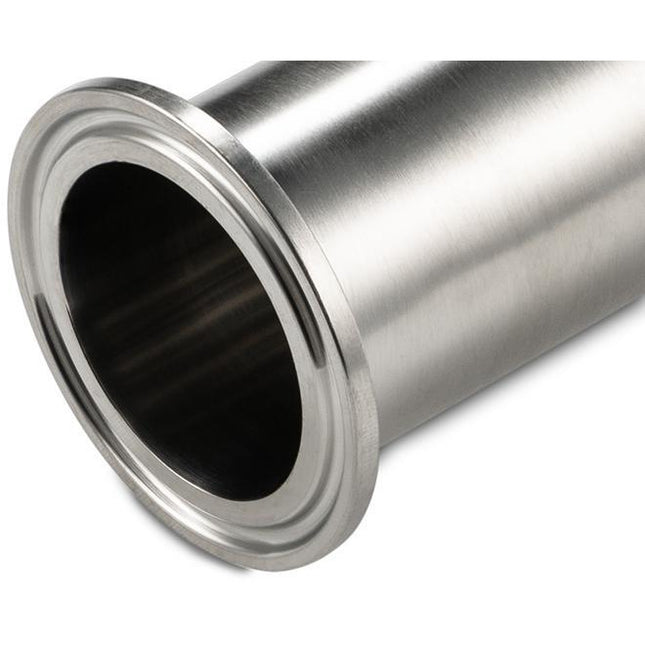
1.5" Tri-Clamp Spools
1.5" Tri-Clamp /Tri Clover Spools Sizes Available: 1.5" x 2" Tri-Clamp Spool 1.5" x 6" Tri-Clamp Spool 1.5" x 12" Tri-Clamp Spool 1.5" x 18" Tri-Clamp Spool 1.5" x 24" Tri-Clamp Spool 1.5" x 36" Tri-Clamp Spool Specifications: Tri-Clamp Size 1.5" Material 304 Stainless Steel Standard 3A High Polish Spool OD 1.5" Spool ID 1.37" Flange OD 1.984" Bead Center 1.718" OD = Outer Dimension ID = Inner Dimension Disclaimer to Customer: User assumes all responsibility and risks of the system for all Stainless Steel Parts bought separately to piece together a Closed Loop, Closed Column, or Open Blast Extractors. They DO NOT come with a standard 1 year system warranty, customer assistance on how to run your system, technical help or a guarantee of the system being tested. BVV™ 1.5" Tri-Clamp Spools - Drawing
$22.00 - $56.00
-
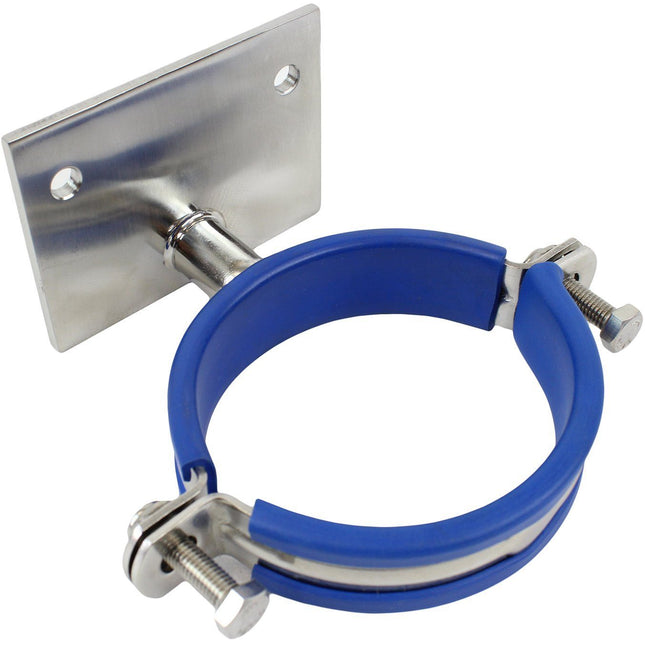

Pipe Hangers with Bracket Mount
Pipe Hangers Pipe Hangers Designed to fit on our racks. They range in sizes from 1.5" - 14" Diameter. Disclaimer: 4" and 6" Brackets have a new design incorporating the hang on bracket as one piece. Depending on size and availability, these may come with blue or purple rubber lining. ***NOTE: If you are planning to use a pipe hanger on a Dewaxing or Jacketed Column please choose a size that is 2" larger than the tri-clamp size.
$35.00 - $105.00
-
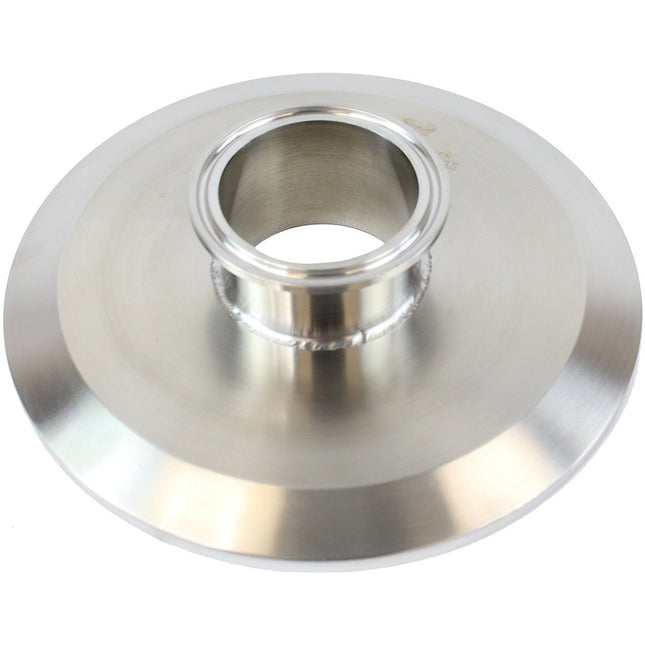

Flat Tri-Clamp Reducer
Flat Tri-Clamp/Tri-Clover Reducers Flat Tri-Clamp reducers allow the user to connect differently sized Tri-Clamp parts to each other without adding to the overall size of your extraction system. These reducers are offered in Tri-clamp x Tri-Clamp connections Sanitary Fittings end cap reducers are often used as an increaser flowing from smaller to a larger diameter which makes them suitable in horizontal flow applications, available in eleven sizes. Specifications: Material: 304 Stainless Steel High Polish Interior Standard: 3A Connection Type : Tri-Clamp x Tri-Clamp
$24.00 - $140.00
-
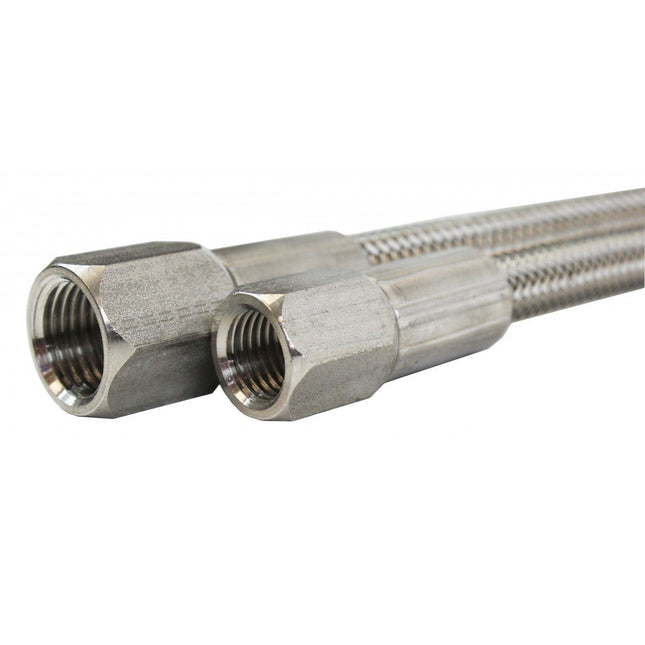
1/2" 37 Degree JIC Braided Stainless Steel Hose
1/2" 37° JIC Braided Stainless Steel Hose These chemically resistant PTFE braided hoses are a necessity when dealing with harsh chemicals or solvents and high-pressure applications. They provide a uniquely rugged, durable, and chemically resistant combination of Stainless Steel and PTFE by having an inner core of PTFE and protecting that with a braided stainless steel outer sleeve. These hoses have female JIC swivel on each end and they DO NOT require Teflon tape to create a seal and they should always be tightened and untightened using 2 wrenches. ***Note: Do not exceed the specified hose bend radius or the inner PTFE liner will kink and the hose integrity will become compromised and should not be used. Stainless Steel Hose Technical Data Sheet Specifications: Connection Type(s): 1/2" 37° Female JIC Swivel (3/4-16) Liner Material PTFE (Teflon) Braid Material 304 Stainless Steel Swivel Material 304 Stainless Steel Temperature Rating -65° to 450°F Pressure Rating 1500 PSI Chemical Resistance Excellent Max Bend Radius 5-1/2"
$56.00 - $155.00
-
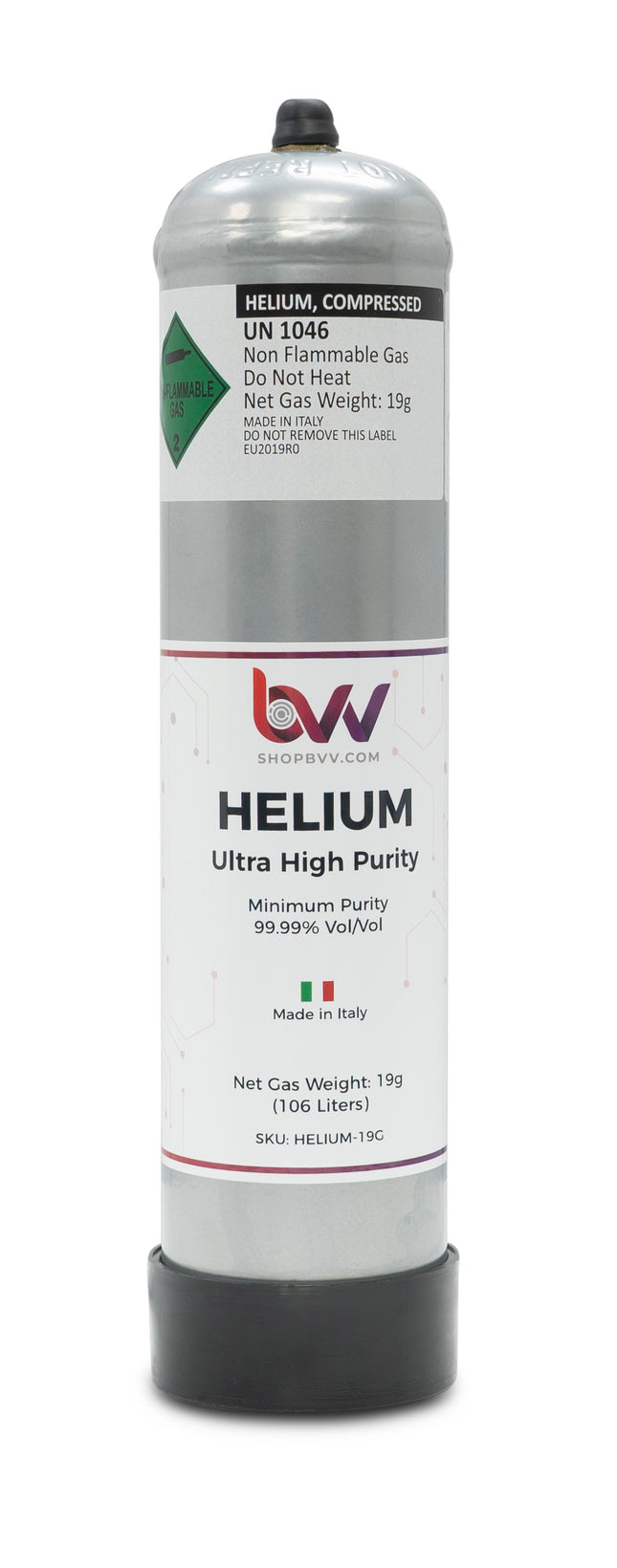

High Purity Helium Tank 99.99% (19g / 106 liters)
Helium Tank High Purity 99.99% Pure Made in Italy Our high purity helium tank arrives filled with 103 liters of compressed helium gas. The gas can be removed using our regulator or valve dispenser that attaches to the top of the tank. This tank will produce a continuous ~31.5 Seconds of helium @ 80PSI. Tank Thread: M11 x 1.0 Regulator Thread: M11 x 1.0 (Connects to tank) Regulator Output: 1/4" Brass Barb Valve Dispenser Output: 1/4" Brass Barb Valve Dispenser Thread: M11 x 1.0 (Connects to tank) *Tank is non-refillable *At end of use, completely empty the tank for recycling. The balloon in the photo is a demonstrates the full quantity of gas in the tank. *Note Helium Tank Pressure is 1595 PSI Tank Volume of Helium Product Sku: 19g / 103 Liters / 3.76 cubic feet HELIUM-19G Regulator/Dispenser Details (not included with tank only purchase) Regulator - Adjustable via. needle valve, regulated to 80 PSI. Made in Italy. Thread: M11x1 (tank connection). Output: 1/4" Barb to connect to any hose with a 1/4" I.D. (inside diameter) Gauges read in BAR. M11 Valve Dispenser Kit - Includes adjustable pushpin style valve dispenser. Output: 1/4" Brass Barb, NO GAUGES Note* This is high purity helium and helium is the second smallest atom in the universe. Consider that helium nucli are so small that they can pass through gold foil without hitting other gold nucli. As discovered in the Rutherford Gold Experiment. When using high purity helium with latex a barrier should be used like HiFloat or Polyvinyl alcohol, To maximize float time on your balloon. It creates an extra barrier which slows down the rate at which helium escapes through latex. Chemical Formula: He Molecular Weight: 4.00260 g/mol CAS Registry Number: 7440-59-7 Appearance Colorless Odor: Odorless Density 0.0104 lb/ft3 Boiling Point: N/A Solubility in water: Slightly Soluble GHS Pictograms: GHS Signal Word: Warning GHS Hazard Statements: H280, H281 GHS Precautionary Statements P282, P336+P317, P403, and P410+P403 UN Identification Number: 1046 Proper Shipping Name: Helium, Compressed Transport Hazard Class: 2.2 Packing Group: None DOT Placard: Helium Safety Data Sheet (SDS)
$59.00 - $158.00
-
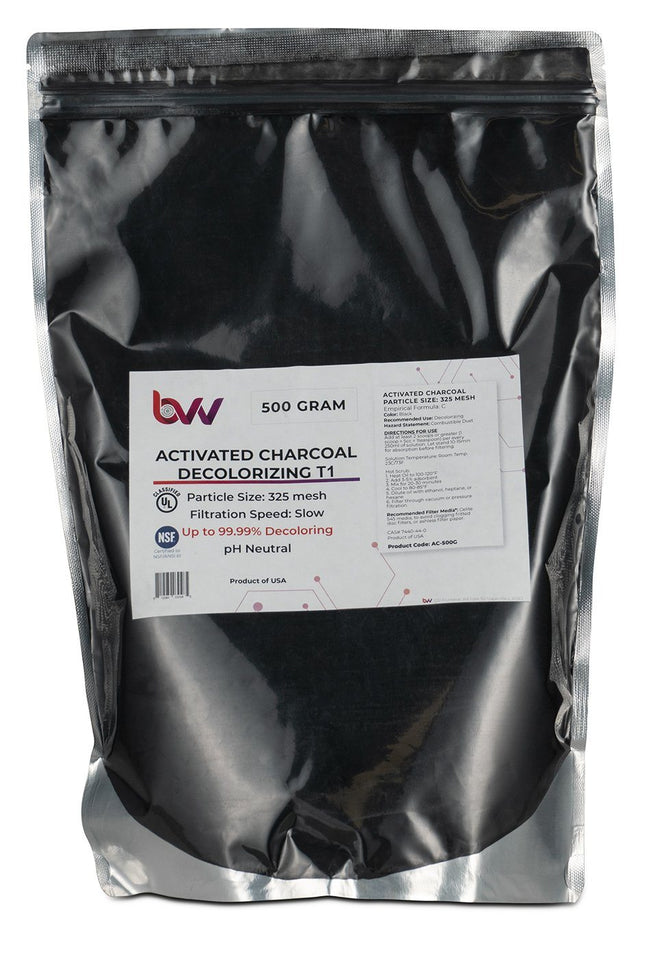

Activated Hardwood Carbon (Charcoal)
Activated Carbon Decolorizing T1 100% Hardwood NSF 61 & UL Classified for food and Consumption Contact BVV™ Activated Carbon or Charcoal powder is some of the highest purity and quality activated charcoal on the market. Made in the USA, and 100% Hardwood. Activated charcoal can be used for several processes in the laboratory and can be most importantly used for the removal of color, unwanted chemical impurities, and unwanted flavors in the starting material resulting in a more refined purer end substance. Each bag includes a 5cc scoop inside. pH:7NSF 61 Certified & UL Classified. Guaranteed the product is free of harmful chemicals, and can be used in systems that humans come into contact consuming. Lot certificates can be available per request. BVV™ Activated Carbon Technical Data Sheet BVV™ Activated Carbon Decolorizing T1 SDS Note: Bulk Bags and Bulk sizes are non-stocked items and will be ordered as needed and carry a several weeks lead time and require a forklift or pallet jack
$48.00 - $3,500.00
-
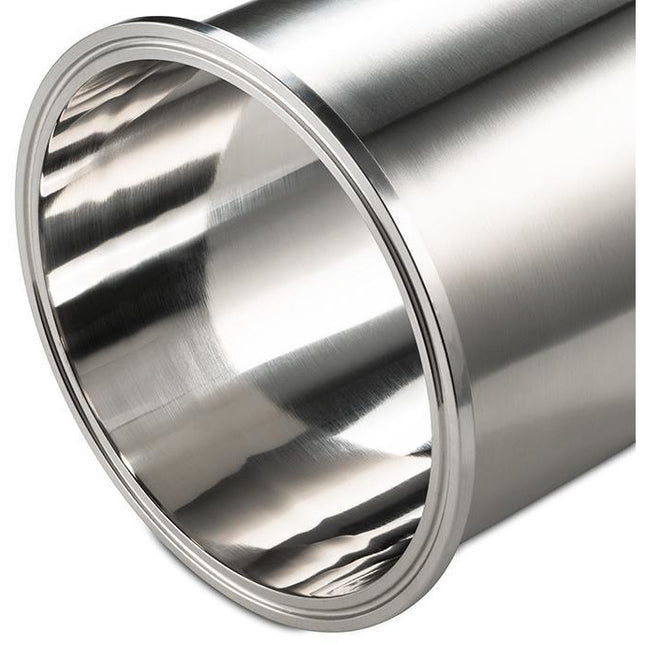
6" Tri-Clamp Spools
6" Tri-Clamp / Tri Clover Spools Sizes Available: 6" x 6" Tri-Clamp Spool 6" x 12" Tri-Clamp Spool 6" x 24" Tri-Clamp Spool 6" x 36" Tri-Clamp Spool 6" x 48" Tri-Clamp Spool Specifications: Tri-Clamp Size 6" Material 304 Stainless Steel Standard 3A High Polish Spool OD 6" Spool ID 5.78" Flange OD 6.57" Bead Center 6.156" OD = Outer Dimension ID = Inner Dimension Disclaimer to Customer: User assumes all responsibility and risks of the system for all Stainless Steel Parts bought separately to piece together a Closed Loop, Closed Column, or Open Blast Extractors. They DO NOT come with a standard 1 year system warranty, customer assistance on how to run your system, technical help or a guarantee of the system being tested. BVV™ 6" Tri-Clamp Spools - Drawing Material Capacity Cylinder Volume Radius (in) 1.5" 2" 3" 4" 6" 8" 10" 12" Length (in) Volume (in3) Select Material Butane ISO-Butane Propane How Much Will Fit in Cylinder FormulaVolume x Weight of Water x Specific Gravity ConstantsWeight of Water = 0.0360 (lbs / in3)Specific Gravity of = Lbs. of : Recommended: Account for an 80% fill to avoid a hydraulic lock How Much Material Will Fit in the Cylinder Volume Packing Density (g) 2.5 3 3.5 4.3 Grams of Material Lbs. of Material Cans of Butane Cans of Butane by Size Pounds of Butane mL fl oz lbs # of Cans 420 14.2 300 10.1 200 6.7 150 5.07
$133.00 - $360.00
You have seen 48 out of 1649 products




































































